BOLD Investments Minnesota Soybean'S 2023 Annual Report MN Ag Expo Highlights MSR&PC Election Candidates Moroccan Market Movements MINNESOTA SOYBEAN 1020 INNOVATION LANE, MANKATO, MN SOYBEAN THE MAGAZINE FOR MINNESOTA’S SOYBEAN GROWERS March - APRIL 2024 - VOLUME XXII - ISSUE 2 B U S I N E S S MINNESOTA SOYBEAN 1020 INNOVATION LANE, MANKATO, MN INSIDE


P.16 P.10

P.26

P.34

P.70
During MSGA’s Annual Meeting, grower leaders saluted advocates and industry supporters who helped make 2023 an all-around winning season.
A new workshop launched by MSGA and Profinium at MN Ag Expo provided younger and emerging producers with relevant information to advance in their careers as farmers and industry leaders.
Each year, Minnesota soybean farmers from across the state have a chance to vote for their checkoff representative on the Minnesota Soybean Research & Promotion Council. Meet the six producers running for seats in this spring’s election.
In MSR&PC’s “sweat equity” search for developing markets, Morocco is a prime target. In early 2024, Director Gene Stoel joined the Minnesota Department of Agriculture for a tour of one of the globe’s largest importers of U.S. soybean meal.
Checkoff research helps growers stay on track of pests and diseases. Angie Peltier of the University of Minnesota recently spotlighted how the soy checkoff is addressing the state’s agronomic challenges.
MN SOYBEAN CONTENTS
ABOUT THE COVER
The Minnesota Soybean Research & Promotion Council hasn’t become a leader on the national stage by playing it safe. The farmer-led board, which directs the state’s soy checkoff program, sets a bold course on the road to boosting profitability. In this special issue, we highlight the intrepid checkoff projects that make Minnesota stand out in the crowd.
Read on Page 38
2 - Soybean Business - MARCH - APRIL - 2024
MISSION STATEMENT
Tell the compelling stories behind Minnesota’s soybean farmers and their industry, from the field to Capitol Hill to international markets – and everywhere in between.
Minnesota Soybean Growers Association Officers and ASA Directors:
OFFICERS
Bob Worth
President
Lake Benton, MN
Lincoln County
Darin Johnson
Vice President Wells, MN
Faribault County
Rose Wendinger
Secretary
St. James, MN Watonwan County
Ryan Mackenthun
Treasurer Brownton, MN
McLeod County
ASA DIRECTORS
Jim Kukowski
Strathcona, MN
Roseau-LOW Counties
Jamie Beyer
Wheaton, MN Traverse County
George Goblish
Vesta, MN Redwood County
Adam Guetter
Wabasso, MN Redwood County
Christopher Hill Brewster, MN Jackson County
Michael Petefish
Claremont, MN Dodge County
Jeff Sorenson
Morgan, MN Redwood County
ASA YOUNG LEADERS
Parker Revier & Gabrielle Carmichael
Morton, MN
Renville County
COUNTY DIRECTORS
Trevore Brekken
Crookston, MN Polk County
Mark Brown
St. James, MN Watonwan County
Steve Brusven
Cottonwood, MN Yellow Medicine County
Chris Bryce
Glenwood, MN Pope County
Jason Cadieux
Hallock, MN
Kittson County
Brian Fruechte
Verdi, MN
Lincoln County
William Gordon
Worthington, MN
Nobles County
Tom Grundman
Osakis, MN
Douglas County
Corey Hanson
Gary, MN
Norman County
Matt Heers
Owatonna, MN
Steele County
Ray Hewitt
Le Sueur, MN
Le Sueur-Scott Counties
Brad Hovel
Cannon Falls, MN Goodhue County
Jim Jirava Ogema, MN
Becker-Mahnomen Counties
Kyle Jore
Thief River Falls, MN
Pennington-Red Lake Counties
Bob Lindemann
Brownton, MN McLeod County
Paul Mesner Chandler, MN Murray County
Bruce Nelsen
Rose Creek, MN Mower County
Keith Nelsen
Westbrook, MN Cottonwood County
Robert Nelsen
Westbrook, MN Murray County
Tim Nelson
New Richland, MN Waseca County
Lucas Peters
Luverne, MN Rock County
Nathan Potucek Warren, MN Marshall County
Andy Pulk
Wannaska, MN Roseau-LOW Counties
Matt Purfeerst Faribault, MN Dakota-Rice Counties
Tim Rasmussen Rothsay, MN Otter Tail-Grant Counties
Justin Remus New Ulm, MN Brown County
Gary Schoenfeld Waseca, MN Waseca County
Joel Schreurs Tyler, MN Lincoln County
Mike Skaug Beltrami, MN Polk County
Cal Spronk
Edgerton, MN
Pipestone County
Jamie Seitzer St Peter, MN
Nicollet-Sibley Counties
Lawrence Sukalski Fairmont, MN Martin County
Jeremy Tischer
Breckenridge, MN
Clay-Wilkin Counties
Doug Toreen Bird Island, MN Renville County
Earl Ziegler
Good Thunder, MN Blue Earth County
EDITORIAL STAFF:
MSGA Executive Director
Joe Smentek
Minnesota Soybean Growers Association 888-896-9678 jsmentek@mnsoybean.com
Art Director
Doug Monson Sr. Director of Integrated Marketing Ag Management Solutions 888-896-9678 dmonson@agmgmtsolutions.com
Managing Editor
Drew Lyon Sr. Manager of Communications Ag Management Solutions 888-896-9678 dlyon@agmgmtsolutions.com
Layout Editors Alex Troska atroska@agmgmtsolutions.com
Kaelyn Rahe krahe@agmgmtsolutions.com
ADVERTISING:
Erin Rossow, Sales Manager 507-902-9191 | erossow@agmgmtsolutions.com
Advertising space reservations can be made by the 15th day of the month prior to publication. In consideration of the acceptance of the advertisement, the agency and the advertiser must, in respect of the contents of the advertisement, indemnify and save the publisher harmless against any expense arising from claims or actions against the publisher because of the publication of the content of the advertisement.
CIRCULATION:
Soybean Business is published six times a year on behalf of Minnesota Soybean. Comments and suggestions can be submitted to:
Minnesota Soybean Growers Association, 1020 Innovation Lane Mankato MN 56001

Advertisements within this publication contain the opinions and information of the advertisers and do not necessarily reflect the opinions or views of the Minnesota Soybean organizations or affiliated groups. mnsoybean.org

MARCH - APRIL - 2024 - Soybean Business - 3
Letter from the President Bolder & bigger
In today’s soybean industry, it’s a must that we plan ahead and juggle multiple projects. In our world, there are no shortages of events, political issues and soy checkoff initiatives to keep tabs on – not to mention markets, pests and the weather. Plus, we tackle all these activities while also being mindful of our loved ones and overall health.
In January, after months of strategizing with our industry partners and our friends at Minnesota Corn, we held our annual MN Ag Expo. This year’s conference and trade show once again notched a record attendance, thanks to a sold-out trade show floor, a dynamic agenda and participation from soybean county delegates from across the state. As president of MSGA, I thank all our delegates for participating in this important resolution process. Through proper preparation, these resolutions help serve as our policy playbook for the year ahead.
MN Ag Expo was merely one of the first events in a packed calendar to start 2024. As you’ll read in this issue, MSGA Executive Director Joe Smentek joined farmer Gene Stoel, a director with the Minnesota Soybean Research & Promotion Council (MSR&PC), on a trade mission to Morocco with the Department of Agriculture. Morocco is a promising market for our soybeans, and Joe and Gene did a fantastic job representing our two organizations overseas. I also managed to juggle travel while staying informed of legislative happenings in St. Paul and Washington, D.C. In February, I was privileged to join colleagues, including MSR&PC Chair Tom Frisch, during the annual Clean Fuels Conference. We all left feeling energized for the future of biodiesel and sustainable aviation fuel, which we hope takes flight in the years ahead. While attending the conference, we also advocated for growers on many issues back home, from keeping chlorpyrifos in our toolbox for 2024 (hat tip to Minnesota Department of Agriculture Commissioner Thom Petersen!) to preparing for the 2024 legislative session.
The pace hardly let up from there. Our Legislative Receptions and Hill Visits in February were closely followed by Commodity Classic in Houston, where we brought our state resolutions to the American Soybean
Association full delegate session. Our agenda remained full into March: Following Commodity Classic, farmer leaders flew to Washington, D.C., for ASA board meetings and our national Hill Visits, where we met with our congressional delegation and their legislative aides. Following MSGA’s April board meeting, I anticipate we’ll all be champing at the bit to pause meetings and climb back into the planter to start another growing season.

Our partners at MSR&PC know a thing or two about making plans. When making checkoff investments, it’s critical that the farmer-led Council plants seeds to grow for the long term. That’s why the Council takes bold measures, from investing soy checkoff resources into growing the Uzbekistan market to promoting checkoff projects at the local level through our one-of-a-kind county program. This is the third year the Council has published its Annual Report in this expanded issue of Soybean Business, and I want to express my gratitude to the entire Council team for continuing to support our award-winning magazine, which once again earned a place in the National Agri-Marketing Association (NAMA) awards this April. The Council’s boldness is nothing if not infectious, and we’re happy to share their successes with our readers.
As I enter the final months of my presidency, I’m filled with gratitude to make final plans for my 54th growing season. From one bold farmer to another, I wish you all the best as you make your own plans this spring.
Sincerely,
 Bob Worth President, Minnesota Soybean Growers Association
Bob Worth President, Minnesota Soybean Growers Association
4 - Soybean Business - MARCH - APRIL - 2024
DEPARTMENT DISPATCH
NITRATE REDUCTION WORK CONTINUES IN SOUTHEAST MINNESOTA

This column is a series in Soybean Business featuring leaders from the Minnesota Department of Agriculture.
Nitrate-nitrogen is one of the most common contaminants in Minnesota’s groundwater, and there are unique geologic features in southeast Minnesota that make the groundwater more vulnerable to nitrate contamination.
Some public and private wells have nitrate levels that exceed the health risk limit for nitrate. Public water systems regularly test for nitrate and ensure levels meet the U.S. Environmental Protection Agency (EPA) standard, while it is the responsibility of private well owners to test their wells. Human activities such as sewage disposal, livestock production, and crop fertilization can elevate the level of nitrate in groundwater.
Last November, the EPA requested Minnesota develop a plan and provide education and outreach, as well as alternative drinking water, to residents with water above the federal and state drinking water standard for nitrate – 10 milligrams per liter (mg/L).
The MDA is concerned about nitrate in groundwater. That’s why we’ve taken significant actions over the past decade, and work is ongoing in the eight southeast counties of Dodge, Fillmore, Goodhue, Houston, Mower, Olmsted, Wabasha and Winona. Many initiatives have involved members of the Minnesota Soybean Growers Association (MSGA).
Here are some examples:
The Nitrogen Fertilizer Management Plan is designed to reduce nitrate levels in areas with vulnerable groundwater. This strategy outlines an approach to assessing agricultural practices and working with the agricultural community to select, adopt and implement recommended best practices in the most vulnerable areas of the state. An important outcome of the plan, which was revised in 2014, was the MDA’s Township Testing Program.
The Township Testing Program offered 21,801 residents in the eight counties a free nitrate test for their drinking water. Of the 8,714 that submitted a sample, 12.1% (1,058 wells) were greater than 10 mg/L. The program has provided foundational scientific information to help identify areas of concern and
COMMISSIONER THOM PETERSEN
prioritize work for state and local partners.
Another outcome of the Nitrogen Fertilizer Management Plan was the Groundwater Protection Rule. Since 2019, the MDA has implemented the rule, prohibiting fall application of commercial fertilizer on 71% of cropland (approximately 1.1 million acres) in southeast Minnesota and over 9 million acres statewide. The MDA has also convened local advisory teams and is working with farmers, including soybean growers, to adopt practices to address local groundwater problems.
The Minnesota Agricultural Water Quality Certification Program (MAWQCP) assesses whole-farm risks to water quality and invests in conservation practices that protect our water resources. On an average certified farm, there is up to a 49% reduction of nitrate loss through the adoption of conservation practices like nutrient management, cover crops, and conservation crop rotation. MAWQCP has certified over 1 million acres statewide, thanks to MSGA’s support, since the program began in 2014. There are 269 MAWQCP-certified producers operating over 191,000 acres (as of December 2023) in southeast Minnesota.
Nitrate reduction work is also happening in southeast Minnesota with the Root River Field to Stream Partnership, AgBMP Loan Program, Nutrient Management Initiative and more.
The MDA is committed to working with farmers, landowners and well owners in southeast Minnesota, in conjunction with the Minnesota Department of Health and Minnesota Pollution Control Agency, on mitigating nitrate contamination in groundwater. Our efforts rely on active participation by local farmers and crop retailers. I encourage you to get involved. To learn more about our nitrate reduction work, visit our website at www.mda.state.mn.us/nitrate.
Thom Petersen, Commissioner, Minnesota Department of Agriculture
MARCH - APRIL - 2024 - Soybean Business - 5

MSGA starts new conversations during annual
Visits Meetings that matter
By Sydney Harris and Drew Lyon
There’s a first time for everything.
As the nation’s longest-running state soybean advocacy group, a dozen directors from the Minnesota Soybean Growers Association (MSGA) met with a slew of legislators for the first time during its annual Hill Visits in St. Paul. For farmer leaders, the initial conversations offered a platform to explain to legislators the basics on MSGA’s mission and policy priorities.
“Our Hill Visits were a huge success,” MSGA President Bob Worth said. “Not only did we get to see both sides of the aisle a lot, but we got to see people we’d never seen before.”
In 2024, MSGA is building on – and protecting – its policy wins from 2023. By partaking in more than 30 one-on-one legislative meetings during Hill Visits, MSGA spread its messaging to both sides of the aisle.
The push to B100
Biodiesel has been a big-ticket priority for MSGA for two decades, starting with the landmark move to B5 in 2005. This session, MSGA farmer leaders are encouraging biodiesel implementation avenues, including the adoption of B100 (100% biodiesel) in state trucks, especially snowplows, through Optimus Technologies.
“We are drumming up support for B100,” said Jamie Beyer, who represents Minnesota on the American Soybean Association (ASA). “Farmers need to be part of the cutting carbon conversation; we’re part of the solution.”
Biodiesel is already cutting carbon in Minnesota; if the state wants to meet its environmental goals, it can continue to lead by adopting B100, MSGA Treasurer Ryan Mackenthun told Sen.
Hill
Bruce Anderson.
“We already have the technology, and it’s reliable,” Mackenthun said. “Biodiesel brings back value to rural Minnesota and our farmers.”
Talking shop
While on the Hill, MSGA highlighted the need to continue addressing deer depredation. Farmers from across Minnesota have reported substantial yield losses and damages. In 2023, MSGA sought a bill that would assist farmers whose operations and feed storage areas have been decimated by deer. Though the legislation didn’t pass, MSGA continues urging legislators and state agencies to find solutions and assist affected operations.
“We really need the Legislature and DNR (Department of Natural Resources) to step up, realize there’s a problem and do something about deer depredation,” Director Brad Hovel, whose soybean crop in Cannon Falls has suffered considerable yield loss from deer, told Rep. Pam Altendorf.
Though MSGA directors could “talk shop” all day, they ensured that before their meeting ended, they touched on priority areas, including protecting crop inputs, transportation and rural infrastructure and keeping farmers on the land despite land pressures from passed legislation.
“We want to see farmers stay on the land,” ASA Director Jeff Sorenson told Rep. Paul Torkelson. “That’s my goal, to pass down the farm to my son.”
For some MSGA directors, returning to the capital city felt like business as usual. On the flip side, Director Kyle Jore made his first appearance at the Capitol since grade school.
“It was a fun experience,” Jore said. “By the time we finished our last visit, I started to know my way around.”

6 - Soybean Business - MARCH - APRIL - 2024
Prior to MSGA’s Hill Visit, the organization hosted a Legislative Reception at the Minnesota History Center. More than 20 legislators, staffers and MDA leaders attended.
“This year’s Hill Visit and Legislative Reception showed that legislators are appreciating the work MSGA is doing on behalf of farmers,” Worth said.
Advocacy in Action

A NORTHERN ‘CLASSIC’
MSGA, Beck’s partner for new golf event
By Drew Lyon
The time is nearing to haul the golf clubs out of winter storage (if they were ever put away, given the unseasonably mild winter), pull on your favorite polo shirt and have sunscreen at the ready.
The Minnesota Soybean Growers Association (MSGA) has cleared the fairway for a new northern golf outing to the event calendar in 2024. On Monday, June 17, MSGA is partnering with Beck’s to host the inaugural Beck’s Soybean Classic hosted by MSGA at Perham Lakeside Golf Course in Perham.
fundraising efforts, and we’re proud to team up with Beck’s for this golf outing.”
The Beck’s Soybean Classic hosted by MSGA will be held in addition to the annual Biodiesel Open, which tees off Aug. 19 at the Crow River Golf Club in Hutchinson.
Partnering with MSGA on a new golf event made perfect sense for Beck’s, a longtime sponsor of MSGA activities, including MN Ag Expo and Soybean Business.

For sponsorship information, contact Erin Rossow at erossow@ agmgmtsolutions.com or by phone at 507-902-9191.
For event details, contact Todd Ginter at Todd@ agmgmtsolutions.com. All proceeds from the Beck’s Soybean Classic benefit MSGA’s
“We’re thrilled to bring a golf event up to the northern region of Minnesota,” said MSGA Director Mike Skaug, who farms in Beltrami. “This will be a great opportunity for more of our farmers to be involved with MSGA and our
“Through our strong partnership with MSGA, Beck’s has been given the opportunity to advance our mission of helping farmers succeed,” says Aaron Nordly, Minnesota area team leader at Beck’s. “The Beck’s Soybean Classic hosted by MSGA is just one of the unique opportunities we can build strong connections with Minnesota farmers, and we couldn’t be more excited.”
Join us on the links for a good time and great cause!
promote
policy in St. Paul and Washington, D.C.
Perham Lakeside Golf Course 2727 450th St. Perham, Minn. 56573 BECK’S SOYBEAN CLASSIC hosted by MSGA MONDAY, JUNE 17 11 AM Registration 12 PM Shotgun Start 5 PM Dinner $130 per golfer $500 4-person team Registration deadline is May 31 LOCATION COST DETAILS
efforts to
farm-friendly
MARCH - APRIL - 2024 - Soybean Business - 7 MSGA Events
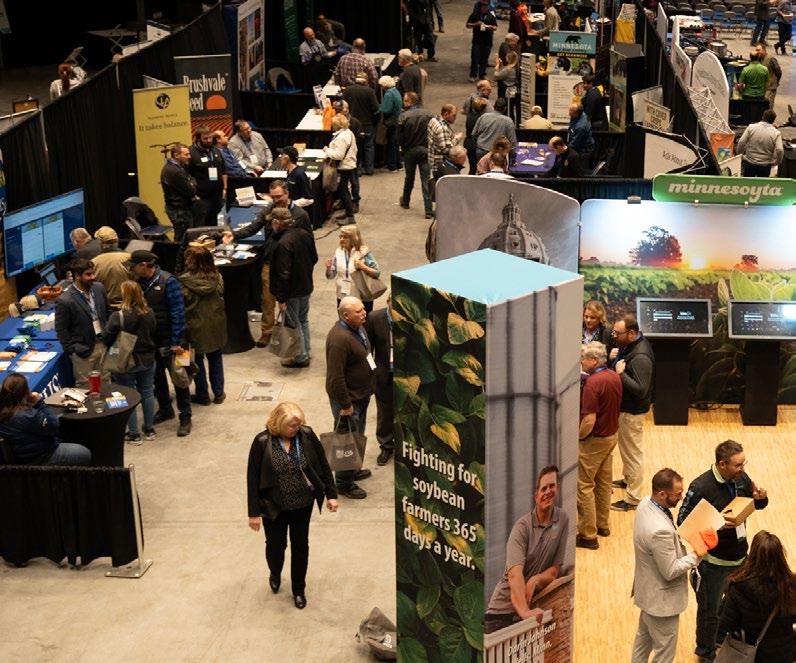

Work hard, play hard. Magic was in the air at MN Ag Expo, as grower leaders got down to business. In between, they found time to share laughs with colleagues and Gophers head football coach P.J. Fleck.
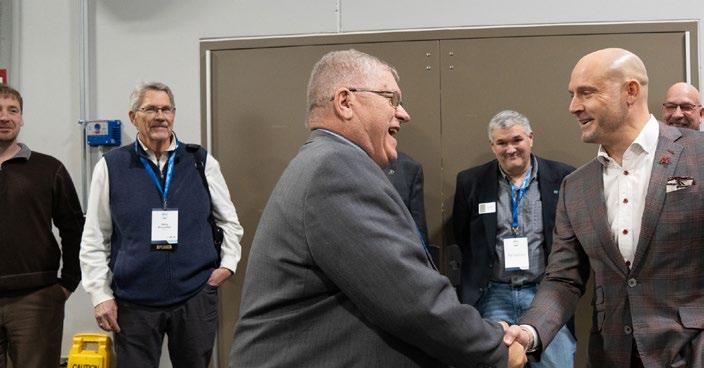
8 - Soybean Business - MARCH - APRIL - 2024
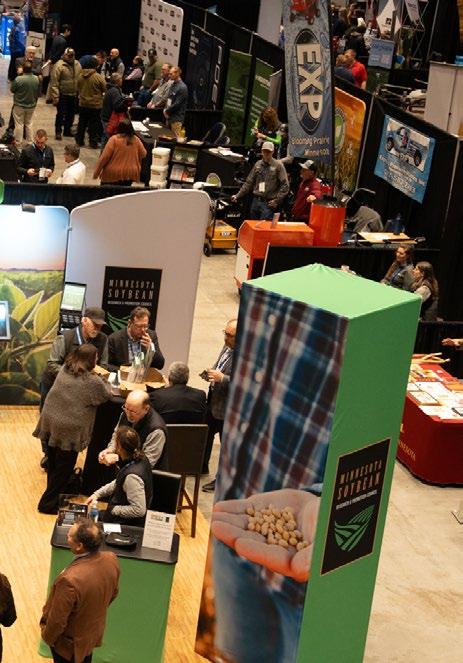
2024 MN AG EXPO
Minnesota’s agricultural community arrived in droves to Mankato for the 2024 MN Ag Expo.
For the second straight year, the state’s premier indoor ag trade show set an attendance record, bringing in about 1,700 farmers and industry professionals for the two-day conference and sold-out trade show.
For the Minnesota Soybean Growers Association, MN Ag Expo was a chance to spotlight the organization’s 2024 policy priorities. The Minnesota Soybean Research & Promotion Council, a top sponsor, used Expo as an opportunity to show the “Behind the Dollar” value of soy checkoff investments through augmented reality and trivia.
From the inspiring message of keynote P.J. Fleck to MSGA’s Expo After Hours social event, education, networking and engagement topped the scoreboard this year.
See you next year in Mankato at the 2025 MN Ag Expo! Save the Date: Jan. 22-23, 2025.


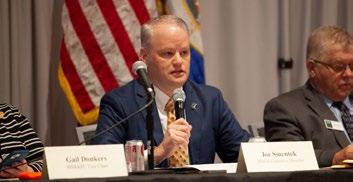

20 24 MN AG EX PO Mank ato MSGA Events

STANDING OUT in the field
MSGA, MSR&PC honor leaders at MN Ag Expo
By Soybean Business Staff
During the Minnesota Soybean Growers Association’s (MSGA) Annual Meeting at MN Ag Expo, directors from both MSGA and the Minnesota Soybean Research & Promotion Council (MSR&PC) recognized directors and industry leaders who helped make 2023 a banner year for both organizations. MSGA also debuted a new award – the Spirit of MSGA, which recognizes legislative leaders who put policy above politics.
Congratulations to all the winners!
Jan. 17, 2024. 10 - Soybean Business - MARCH - APRIL - 2024
MSGA President Bob Worth speaks during the organization’s Annual Meeting on
Minnesota Soybean’s County of the Year – Clay-Wilkin
Corn & Soybean Growers Board
Presented by MSGA Executive Director Joe Smentek
Minnesota is proud to be the only state with an organized soybean county program. Sure, we brag about this often, but this is for good reason. MSGA and MSR&PC’s successes over the decades can all be traced back to the county level – including the growth of biodiesel to raising ag homestead credits to the success of our Stepping Up and Driving Soy checkoff promotions.
That’s why, each year we recognize one of our over 45 counties that go above and beyond to promote soybeans in their community. This is never an easy decision to make: Our county program managers all make a strong case for their counties, and this year was no different.
But after much deliberation, we had to select a winner and the Clay-Wilkin Corn & Soybean Growers Board is certainly a worthy recipient of this honor. This county features one of the younger boards in our program. They are very well organized and communicate with each other effectively and regularly. The board has a strong relationship with area schools and understands the role county growers play in educating their community partners about agriculture. And despite many of the members having young families and busy lives, they all seemed to find ways to stay active in their county activities.
During 2023, board President and MSGA Director Jeremy Tischer hosted an international trade team on his farm, where he and fellow board member Andrew Mages presented on soybean farming and other practices in the Red River Valley. The board also had a booth at the annual Breakfast on the Farm and gave away 15 pairs of soy-based shoes and a set of soy-based tires. Other highlights from the year included a donation of two sets of soy-based Goodyear Wrangler Workhorse H/T tires to Farm Rescue; an enclosed trailer for the Hawley Fire Department to use for storing their grain bin rescue equipment and FFA scholarships. In addition, board member Kari Olson was nominated as a finalist for Woman of the Year at the 2023 Farmfest.
By being strong advocates for soybeans and spreading goodwill in their community, Clay-Wilkin is sharing our message and setting a high bar for next year’s winner.
Spirit of MSGA – Rep. Angie Craig and Rep. Brad Finstad
Presented by MSGA President Bob Worth
We’re excited to unveil a new award during this year’s annual meeting. The Spirit of MSGA Award reflects MSGA’s bipartisan philosophy. Working across the aisle for the betterment of agriculture is an important part of how we advocate in St. Paul and Washington, D.C., and this award recognizes legislative leaders who reflect our values by supporting farm-friendly policy without getting bogged down in political fights that prevent legislative progress.
Continued on page 12
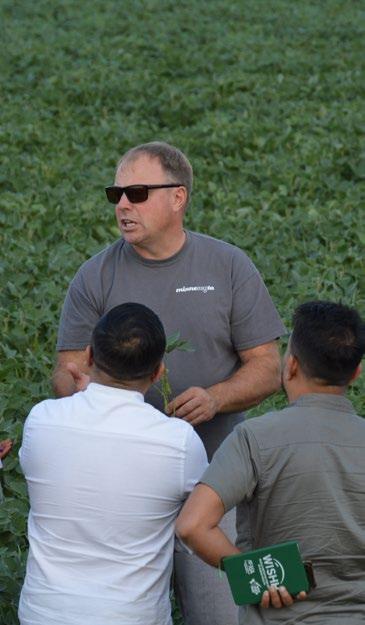
MSGA Director Jeremy Tischer, pictured here while hosting a trade team in summer 2023, is president of the Clay-Wikin Corn & Soybean Growers, which were named MSGA’s County of the Year for community outreach and engagements.
MARCH - APRIL - 2024 - Soybean Business - 11 Soybean Business Feature
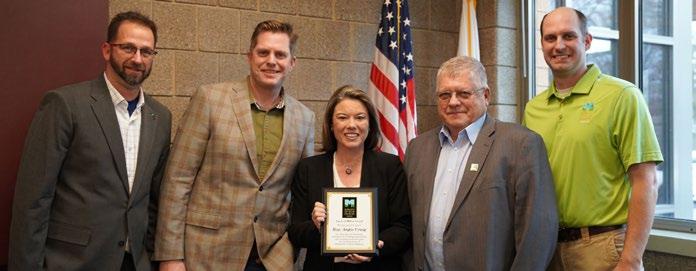
This year, we’re proud to name Democratic Congresswoman Angie Craig and Republican Congressman Brad Finstad as winners of the inaugural Spirit of MSGA Award. In their respective positions as legislators and members of the House Ag Committee, Representatives Craig and Finstad put politics aside to promote policies that benefit farmers –from supporting the biodiesel tax credit to advocating for the Farm Bill. Often times, finding solutions means reaching across the aisle, even when it’s not politically popular. Both of these legislators lead by their examples. During our visits with these legislators, we’ve seen firsthand how they support MSGA and the agriculture industry as a whole.
We thank Congresswoman Craig and Congressman Finstad and look forward to visiting with them during our March Hill Visits in Washington, D.C.
MSGA Industry Partner of the Year – UMN Extension, 4-H
Presented by Bob Worth
The recipient of our Industry Partner of the Year Award is one that is near and dear to our hearts: The University of Minnesota’s 4-H Extension program. Many of us are proud 4-H alumni and are still affiliated with this organization. MSGA also supported 4-H and FFA’s efforts to gain legislative approval for the new agricultural license plates that many of us now have on our vehicles.
Minnesota 4-H is the largest youth development program in the state, serving over 40,000 young people across the state each year. 4-H offers out-of-school, hands-on learning opportunities across Minnesota for youth in kindergarten through one-year post-high school. We are proud to support their efforts in developing the next generation of agriculture professionals through education and volunteer efforts. Accepting this award today on behalf of 4-H is Bev Durgan, who serves as Dean of University of Minnesota Extension and is also a member of MSGA. We’re also pleased to welcome two 4-H Agriculture Ambassadors: Arabelle Rohs from Sherburne County and Ellie Sauder from Dodge County.
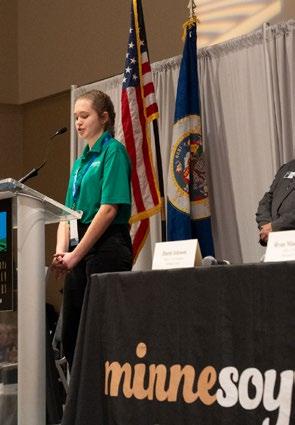
12 - Soybean Business - MARCH - APRIL - 2024
Congressional duties prevented Rep. Angie Craig from attending MSGA’s Annual Meeting. Instead, growers visited with her the next week to present her with the Spirit of MSGA Award. Rep. Brad Finstad will receive his plaque when MSGA visits Washington, D.C., in March.
“I want to express my deepest thanks (to MSGA) for your incredible contributions to the community and to the agricultural landscape,” says 4-H Ambassador Arabelle Rohs.
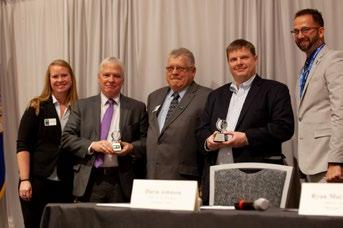
MSGA Soy Advocates of the Year – Cory
and A.J. Duerr
Presented by Bob Worth
Through our resolution process, our board and delegates help set MSGA’s policy agenda for the year ahead. But, let’s face it, our priorities would go nowhere without a strong lobbying team. Our board and delegates set a clear direction, while our lobbyists are MSGA’s boots on the ground at the Capitol. That’s how the world of policy works: You’re either at the table or on the menu.
We’re biased, but we have the best of the best speaking up for us at the policy table: Cory Bennett and A.J. Duerr. They roll their eyes and catch grief from colleagues when we call them our “Dynamic Duo” – but in all seriousness, in an often-difficult legislative environment in St. Paul, Cory and A.J. deliver huge results for MSGA and our industry. They’re able to work miracles for MSGA because Cory and A.J. have built relationships with legislators from both parties, along with developing ties with agency leaders. They are highly regarded members in their field; they’ve earned their reputations by promoting and articulating MSGA’s priorities with passion, knowledge and respect.
The proof is in the details : Over the last handful of years, Cory and A.J. have played a part in MSGA achieving a long list of policy wins in St. Paul, including (but certainly not limited to):
• Millions of dollars in tax relief for farmers
• Nearly $6 million in state support for the Ag Innovation Campus
• Protected biodiesel and pesticides
• Stopped countless regulations from becoming law
• Advocated for more funding for MDA’s international trade programs
• Established a fully funded grain indemnity fund
• Delivered critical assistance to producers during the peak of the COVID-19 pandemic
“Advocacy
Continued on page 14
We could go on, but you all get the point. Every strong advocacy group needs a strong lobbying team, and MSGA is fortunate to have two of the finest in their profession representing us in St. Paul.
It’s very rare for this award to go to a non-director, but this year’s award merited an exception. It’s our privilege to recognize Cory and A.J. as this year’s MSGA Soy Advocates of the Year award.
At this time, I’d also like to recognize a farmer leader who recently termed off ASA last month. He also happens to be a dear friend of mine and a fellow farmer from Lincoln County.
Special Recognition – Joel Schreurs
Presented by Bob Worth
Joel Schreurs recently completed his nine-year term on the American Soybean Association. Joel represented MSGA and ASA with distinction and has become one of our industry’s top experts on international trade. When the United States-Mexico-Canada Agreement (USMCA) needed a final push to get across the finish line, Joel was one of the directors ASA selected to fly-in to D.C. to urge Congressional leaders for their support. As we all recall, that crucial legislation was soon passed, in part thanks to Joel’s leadership.
Over the course of his three terms on ASA, Joel has made dozens of trips to Washington, D.C., and built relationships with legislators, their aides and federal agencies. We are grateful to Joel for his dedication to MSGA and ASA and are proud to honor him today and wish him well in his future leadership pursuits. I’d also add that he’s one of the only directors I know who has the confidence and style to pull off wearing a tan suit at the Capitol. Well-played, Joel. You are one cool customer.
Continued on page XX
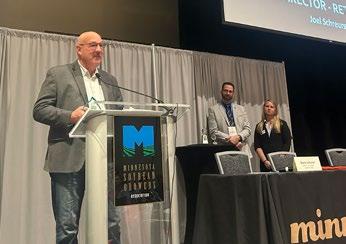
MARCH - APRIL - 2024 - Soybean Business - 13
Bennett
MSGA surprises lobbyists Cory Bennett (second to left) and A.J. Duerr (second to left) with the Soy Advocates of the Year award.
is a team sport,” says Joel Schreurs. “It takes everybody.”
Industry Leader of the Year – Joe Gill, KASM Radio
Presented by MSR&PC Vice Chair Gail Donkers
Each year, the Council recognizes an Industry Leader of the Year who speaks up for industry at every turn. This year’s Industry Leader of the Year quite literally uses his platform as a voice for agriculture each day from the cozy confines of KASM radio’s Minnesota Soybean studio. This year, the Council is excited to present this award to the man with the golden voice and a friendly smile, KASM Farm Director Joe Gill.
Over the years, we have been proud to partner with Joe to promote various checkoff investments, from Driving Soy to the Ag Innovation Campus. He’s a constant presence at events we support, including Ag Expo and Farmfest. Our relationship with Joe helps deliver our message to farming audiences throughout greater Minnesota.
Joe has made news in his own right the last year: He’s certainly the only farm broadcaster to make the front page of the Star Tribune in 2023, and Joe also recently completed a year as president of the National Association of Farm Broadcasting. During his term, we certainly noticed when Joe gave a shoutout to our Stepping Up campaign during his welcoming speech at last year’s Commodity Classic.
In his communications with both farmer leaders and staff, Joe has been a professional through and through over the years. We are proud to call him a friend and colleague, and we appreciate our collaboration and look forward to working together in the years ahead.

Whether
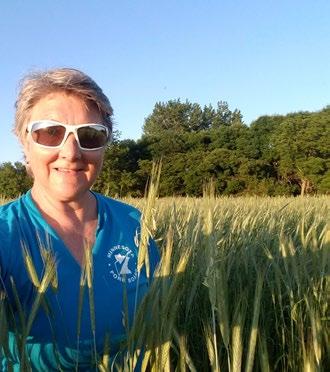
MSR&PC Director of the Year – Rochelle Krusemark
Presented by MSR&PC Vice Chair Gail Donkers
It’s an honor to announce that Rochelle Krusemark has been named as this year’s Council Director of the Year. Rochelle farms in Trimont with her family and is a longtime Council director. In 2023, she was reelected to serve another three-year term as the Council’s District 8 director. Rochelle has served a variety of roles during her tenure with MSR&PC. She’s represented Minnesota on the United Soybean Board, USFRA and the Soil Health Coalition. Along with being a graduate of the Minnesota Agriculture & Rural Leadership (MARL) program, Rochelle is also one of the many Minnesota Soybean directors who took the voluntary step of enrolling in the Minnesota Ag Water Quality Certification Program and has continued encouraging others to become certified.
With her passion for education and sustainability, Rochelle is a strong, vocal advocate for our industry — she’s not afraid to ask tough but necessary questions. It’s not surprising to learn that Rochelle is a former school teacher: She’s always answering the call for farmers. It is a fact that the Council and the soy checkoff have benefited from Rochelle’s insights during her years of leadership. We’re grateful for her ongoing service to our organization and industry and are proud to present her with this year’s award. She’s certainly deserving of the accolades. Congratulations, Rochelle!
14 - Soybean Business - MARCH - APRIL - 2024
she’s highlighting climate-smart practices or promoting ag education, Council Director Rochelle Krusemark is an all-around advocate.
Between partnering with Minnesota Soybean, a profile in the Star Tribune and presiding over the National Association of Farm Broadcasting, Joe Gill had an eventful 2023.
Thank you to our MN Ag Expo and Expo After Hour Sponsors

Sponsors
AgriGrowth
Agris Academy
Ag Country Farm Credit Services
APX Construction Group
Arnold’s Equipment
BASF
Beck’s
Bennett Consulting
C&B Operations
Channel (Bayer Crop Science)
Chevron CHS
Compeer Financial
Crystal Valley
Dakota Access
Duerr Government Affairs
Ellingson Companies
Gislason & Hunter LLP
Houston Engineering
HTS Commodities
International Ag Labs
ISG
Luther Honda of Mankato
Minnesota Biodiesel Council
Minnesota Biofuels Association
Minnesota Corn Growers Association
Minnesota Corn Research & Promotion Council
Minnesota Farmers Union
Minnesota Soybean Growers Association
Minnesota Soybean Research & Promotion Council
Minnesota Pork
Montana Sulphur & Chemical Co
Pivot Bio
Profinium
Scheels
Specialty Soya and Grains Alliance
Syngenta
Wassenaar Ag Supply
County Sponsors
Blue Earth County Corn & Soybean Growers Association
Brown County Corn & Soybean Growers Association
Clay-Wilkin County Corn & Soybean Growers Association
Dakota-Rice County Corn & Soybean Growers Association
Dodge County Corn & Soybean Growers Association
Douglas County Corn & Soybean Growers Association
Freeborn County Corn & Soybean Growers Association
Goodhue County Corn & Soybean Growers Association
Kandiyohi County Corn & Soybean Growers Association
Kittson County Soybean Growers Association
Lincoln County Corn & Soybean Growers Association
Lyon County Corn & Soybean Growers Association
Marshall County Corn & Soybean Growers Association
Martin County Corn & Soybean Growers Association
McLeod County Corn & Soybean Growers Association
Mower County Corn & Soybean Growers Association
Murray County Corn & Soybean Growers Association
Nicollet-Sibley County Corn & Soybean Growers Association
Nobles County Corn & Soybean Growers Association
Norman County Soybean Growers Association
Olmsted-Wabasha County Corn & Soybean Growers Association
Pennington-Red Lake County Corn & Soybean Growers Association
Polk County Corn & Soybean Growers Association
Redwood County Corn & Soybean Growers Association
Renville County Corn & Soybean Growers Association
Rock County Corn & Soybean Growers Association
Roseau-LOW County Corn & Soybean Growers Association
Swift County Corn & Soybean Growers Association
Waseca County Corn & Soybean Growers Association
Watonwan County Corn & Soybean Growers Association
Yellow Medicine County Corn & Soybean Growers Association

MARCH - APRIL - 2024 - Soybean Business - 15 Save the Date: MN Ag Expo returns January 22-23, 2025
20 24 MN AG EX PO Mank ato
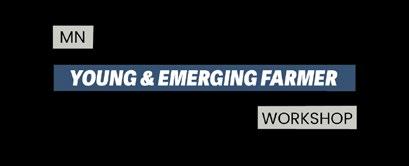
HATS OFF!
New workshop offered younger growers real-world lessons
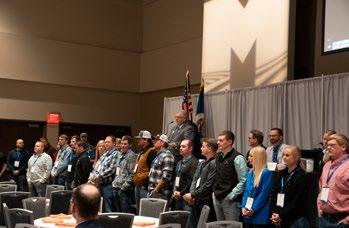
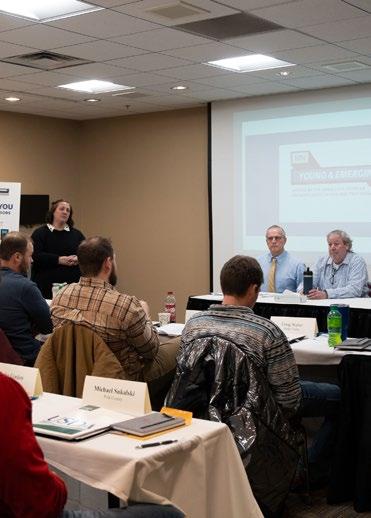 By Kristeena Thisius
By Kristeena Thisius
You’ve heard it before. “Farmers wear many hats.”
And no – we’re not talking about the countless number of seed-logoed hats lying around your house.
From electrician to mechanic to accountant to agronomist to meteorologist to marketer, farmers do it all. Now imagine the feeling of wearing those many hats and being in your first few years of farming.
Introducing the inaugural MN Young & Emerging Farmer Workshop.
Hosted by the Minnesota Soybean Growers Association (MSGA) and Profinium, the MN Young & Emerging Farmer Workshop, which was held simultaneously with MN Ag Expo on Jan. 17-18, 2024, in Mankato, focused on offering practical and relevant breakout sessions and topics custom for those early in their farming career.
“Farmers are expected to be experts in so many areas,” said Adam Guetter, MSGA and American Soybean Association board member, who also farms near Wabasso. “We need to help that next generation be prepared and show them how to start building their team in order to be successful.”
The workshop targeted young and emerging farmers aged 21-45 who are actively crop farming. A short application process was required, and the class was maxed at 40 participants.
16 - Soybean Business - MARCH - APRIL - 2024
Members of the workshop take a break to attend the Minnesota Soybean Growers Association’s annual meeting at MN Ag Expo.
“Over 80 young farmers applied,” said Guetter, who helped spearhead the workshop from its inception. “It showed there definitely is a need and I’m proud we could bring this idea to life.”
Throughout the two days, the group focused on building out financial statements, farm loan options, how to have hard conversations with landlords (even when it’s family), tax planning, grain marketing, succession planning and more.
For the participants, the workshop offered plenty of timely takeaways.
“As young farmers, we are bombarded with new information, new data and new findings almost every day,” said Colin Wegner, a workshop participant who farms with his family near Wells. “This workshop allowed us to come together, learn from industry experts, ask questions, but most importantly, network with others in the same boat.”
Profinium, which offers full financial health services across southern Minnesota, was the title sponsor of the event.
“At Profinium, we believe in achieving dreams together,” Profinium CEO Ron Kopischke said. “When we had the opportunity to support the Young Farmer Workshop powered by Minnesota Soybean, it was an obvious ‘yes’ for us. We were thrilled to partner with Minnesota Soybean and find ways to bring local producers together and help them continue the family farming legacy.”
Other sponsors of the workshop included the Minnesota Soybean Research & Promotion Council, Blethen Berens, Crystal Valley, CliftonLarsonAllen and MN Farm Bureau.
“This was a brand-new initiative for MSGA as we looked for ways to bring value to our young farmers,” said MSGA President Bob Worth. “I am excited to see the next generation so eager to learn and carry on our long-standing farming tradition in Minnesota.”
Continued on page 18
The next generation of farmer leaders learn how to grow in their careers during a panel at the inaugural Young & Emerging Farmer Workshop.
AGENDA TOPICS
The topics and panels for the 2024 inaugural workshop included:
• Building out financial statements
• Building a professional relationship with your landlord (even when it’s family)
• If you could go back in time, what would you tell your younger self?
• Young, beginning and firsttime farm loan options
• Farm Business Management overview
• Grain Marketing 101 with CHS
• Small group breakout discussion (divided by age)
• Agronomic session – including reading and analyzing your soil samples
• Ag policy and why you should care
• Succession planning
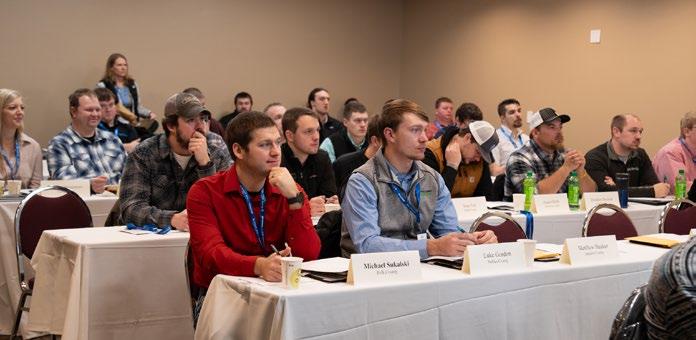
MARCH - APRIL - 2024 - Soybean Business - 17
Checkoff Sponsorships
THE WORKSHOP AT A GLANCE
ABOUT THE PARTICIPANTS
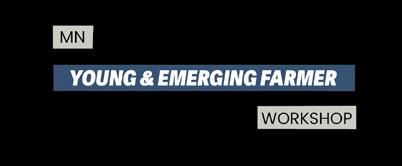
40%
40 percent of the participants have farmed for 5 years or less.
Succession planning
50%
Nearly ½ of the participants also work full time off the farm.
Two participants were also full-time college students, representing South Dakota State University and University of Wisconsin- River Falls.
Over half of the workshop participants currently rent their own land.
One-third of those rent from an outside landlord who is not family.
Building a professional relationship with your landlord/farming with family Farm loan options
According to a post-workshop survey, the top three most valuable sessions were succession planning, farm loan options and building a professional relationship with your landlord/farming with family.
According to post-survey results, the session the participants knew the least about was grain marketing.
100% of the post-survey responses identified the workshop was of value to their farming career.
An anonymous quote from the post-survey response:
Even though I was one of the younger farmers in the room, I valued the information, and the workshop was well worth my time. I felt the topics were relevant to the room of farmers participating no matter their stage in farming.
18 - Soybean Business - MARCH - APRIL - 2024 50% 25% 25% 21-30 31-35 36-45
AGE
50%
%
RESEARCHING A BETTER BEAN
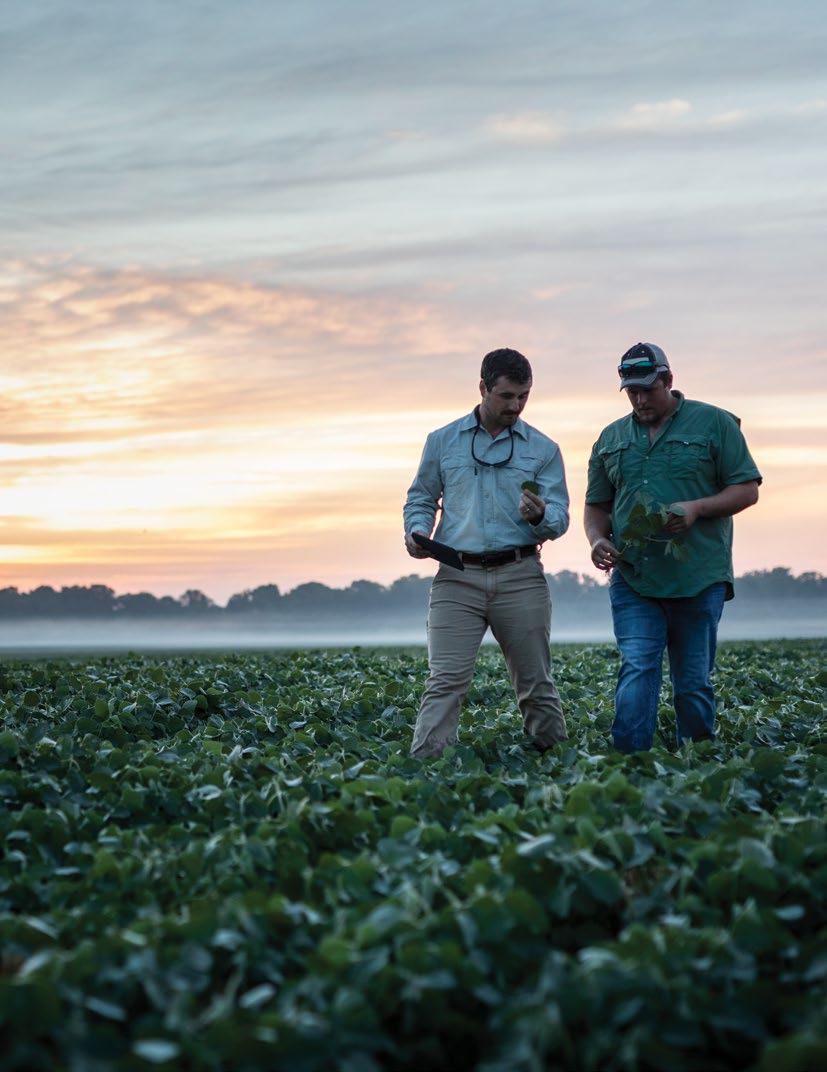
Whether you’re dealing with drought, flood, heat or other climate-related stress, the soy checkoff is working behind the scenes to diversify U.S. soybean genetics and increase stress tolerance. We’re looking inside the bean, beyond the bushel and around the world to keep preference for U.S. soy strong. And it’s helping make a valuable impact for soybean farmers like you.
See more ways the soy checkoff is maximizing profit opportunities for soybean farmers at unitedsoybean.org
unitedsoybean.org Brought to you by the soy checkoff. © 2018 United Soybean Board. Our Soy Checkoff and the Our Soy Checkoff mark are trademarks of United Soybean Board. All other trademarks are property of their respective owners.

MSGA member steps aside from banker role, but not from ag
By Drew Lyon
Kent Thiesse isn’t keeping bankers’ hours anymore, and the agriculture insider is still getting used to the slower pace.
“I’m still in the adjustment phase,” Thiesse said from his home in Lake Crystal.
Give him some time, though. After four decades advising producers in farm management and agricultural lending, Thiesse recently retired from his position as senior vice president and chief ag loan officer at MinnStar Bank in Lake Crystal. Thiesse spent more than 20 years at the bank and felt it was time to dial back his various pursuits.
“I’m at a place in my career where I guess it made sense,” he said.
But by no means is Thiesse completely retired – far from it, actually. He’ll still write his Ag Outlook column for Minnesota Valley Business magazine and pen his popular weekly e-newsletter, Focus on Ag, which is distributed to more than 1,000 subscribers. His childhood buddy, Minnesota Rep. and House Ag Committee member Paul Anderson, said Thiesse’s columns are a must-read look into the agriculture economy.
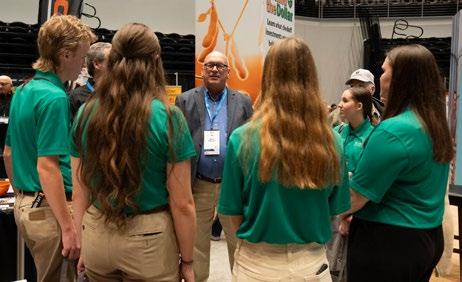
“I really admire his ability to get that column out every week,” said Rep. Anderson, a former newspaper columnist who rode the same Starbuck school bus as Thiesse. “Sometimes, it gets hard to find a topic to write about, but Kent is really amazing at how he can put it out on a weekly basis, even during a holiday.”
Thiesse also has plenty of other irons in the fire. He’s involved with the Lake Crystal Wellcome Memorial School Board, the Lake Crystal Chamber of Commerce and 4-H and FFA groups. He’s also a longtime radio voice of
the Minnesota State Wrestling Tournament and remains passionate about University Extension programs.
“Kent is a very well-respected voice in Minnesota agriculture,” Rep. Anderson said.
His retirement from the banking industry not only frees up time for Thiesse to continue his side ventures, but he’ll also have a chance to spend more time with his five grandchildren.
“You know, I’ve got no big plans,” Thiesse said. “But if the right opportunity comes along, I’d certainly look at it.”
20 - Soybean Business - MARCH - APRIL - 2024
Over the course of his long career in agriculture, Kent Thiesse has always maintained a passion for 4-H. At the 2024 MN Ag Expo, he visited with 4-H officers from across the state.
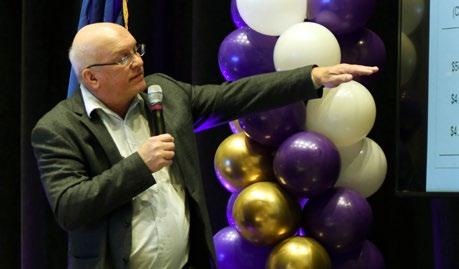
Giving through involvement
It’s a small world, and the agriculture word is even more compressed. A native of Martin County, Thiesse spent part of his childhood on a farm in Pope County, where his dad raised grains, including soybeans. The Thiesses lived just a half-mile from Paul Anderson. And about a half-mile down the road lived Paul Freeman, who later became president of the Minnesota Soybean Growers Association (MSGA) and now serves on the Minnesota Soybean Research & Promotion Council. Freeman is a few years younger than Thiesse but remembers Thiesse on the 4-H judging team alongside Freeman’s older sister.
“That was his first big success,” Freeman said. “Kent’s sure given a lot.”
Thiesse is also a longtime member of MSGA and has appeared as a speaker and moderator at events including organized county events, MN Ag Expo and Farmfest, further raising his public profile. To close out the 2024 MN Ag Expo, Thiesse moderated a biofuels panel.
“I’ve always had a high degree of
respect for Minnesota Soybean,” he said. “I’ve always been impressed with the people they’ve had working for producers and what the organization’s been able to accomplish.”
Thiesse also developed friendships with numerous farmer leaders, including MSGA Director Earl Ziegler, President Bob Worth and the late Gary Joachim.
“It’s kind of a second-to-none organization with what they’ve been able to do over the years,” he said. “I’ve always tried to be involved. It’s just a great relationship. And it’s great that it’s not just statewide, but (Minnesota Soybean) has really tried to be involved at the local level because not everybody gets involved at the higher level.”
Thiesse worked as a farm mediator in Rock County during the peak of the 1980s farm crisis — an era he has no desire to relive.
“Boy, those were some tough times,” Thiesse said.
Over the past 40 years, Thiesse said technology advancements have made the tough times a little bit easier to navigate.
“Technology has totally changed everything — for farmers and folks like myself who work with farmers and most of it is good because it’s instantaneous,” he said. “You can respond to folks instantaneously and get them the information they need and just some of the tools that are available through technology are amazing, really.”
Though challenges always pop up in agriculture, Thiesse remains optimistic about market conditions.
“We come into this year in a pretty good position because we’re coming off a couple of really good years, profit-wise,” he said. “There’s a lot of positives out there with soybeans and some of the newer processing plants that are coming online. That certainly adds to a lot of optimism out there.”
Farmfest isn’t until August, but Thiesse, who helps coordinate the forums inside the Wick Building, is already working with organizers to plan this year’s speaking agenda.
“Of course, this year will be an election year, so we’ll probably have a couple of candidate forums in there,” he said. “I’m definitely looking forward to that.”
MARCH - APRIL - 2024 - Soybean Business - 21
Soybean Business Feature To subscribe to Kent Thiesse’s weekly Focus on Ag column, which is typically sent on Mondays, email kentthiesse@ gmail.com.
Kent Thiesse offers his financial advice during the 2022 MN Ag Expo. He’s also a close observer of politics and plans to host policy forums at Farmfest this August.
MN AG EXPO EXPRESS All aboard!
A Minnesota Ag Expo road trip
By Mark Askelson
From the flat fertile grounds of the Red River Valley through lakes country and down to the rolling hills of southern Minnesota, soybean country encompasses a wide and diverse landscape. Thus, it should be no surprise that the farmers who plant soybeans are themselves a very diverse group as well. Put them together and you’ll find jokers, storytellers and philosophers; parents and grandparents; men and women; social butterflies and introverts.
Pack them all onto a bus and send them down to MN Ag Expo every January, and it has all the ingredients for an engaging social experiment –and lots of fun.
“You have many different personalities, but all of them are friends and they all look forward to this trip every year,” said Minnesota Soybean Communications Specialist Lorri Ann Hartel, one of the two organizers of the trip and self-
For northern Minnesota farmers, time flies when sharing a ride with good company on the five-hour drive down to Mankato.
described “bus moms” who keep everyone in line.
The annual bus trip to Ag Expo, which begins in Red Lake Falls, has been taking place for more than a decade, picking up guests along the way in Fertile, Ada, Fergus Falls, Alexandria and Osakis. Overall, passengers from 10 different counties are represented on the luxury motor coach. For the folks in the northern
counties wanting to make the trek for corn and soy annual meetings, signing up for the bus ride is a no brainer.
“It’s a nice option for us here up north who wouldn’t normally make the long trip to Mankato,” said John Swanson, who farms in Polk County. “And the weather this time of year is usually very cold, so good company and good conversations help warm things up.”
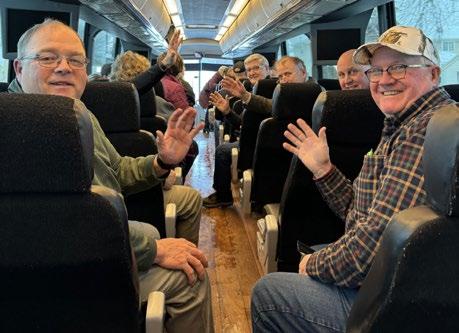
22 - Soybean Business - MARCH - APRIL - 2024
In her role working with Minnesota’s organized soybean counties, “bus mom” Lorri Ann Hartel helps coordinate the trip down to Mankato for MN Ag Expo.
On the way down, Swanson conversed with Pennington County farmer David Garry. They discussed things such as farming practices and funny farming stories. Garry has cultivated a reputation as a practical joker and had no shortage of stories to tell.
And while Garry is quite the jokester, the bus has its own resident comedian: Kittson County farmer Chuck Dziengel. Each year by request, Dziengel heads to the front of the bus to share his deep inventory of jokes you would expect a mild-mannered farmer from northern Minnesota to tell. One-liners about the Minnesota Vikings, farming jokes and, of course, the always popular tales about Ole, Lena and Sven.
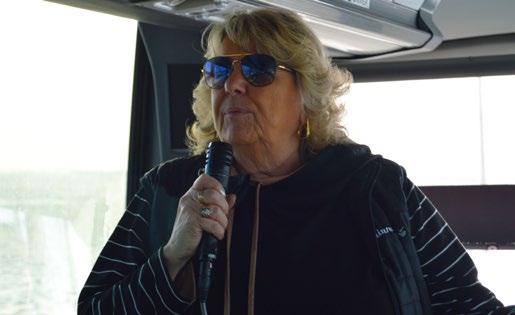
(Minnesota Soybean Growers Association Director) Mike Skaug found out and made me get up and tell a few of them during the trip one year,” Dziengel said. “They haven’t booed me off the bus yet.”
“I started telling these jokes one day in church when we had an unexpected delay in the service.
Dziengel’s Zany Comedy Hour (it’s about a 15-minute set) isn’t the only prizeworthy form of entertainment aboard the luxury coach. Hartel, who works with organized soybean counties in northwest Minnesota, and Minnesota Corn’s Marlene Dufault,
the other organizer and “bus mom,” also host a spirited game of Bingo. Contestants play for a chance to win swag from Minnesota Soybean and Minnesota Corn. Norman County’s David Swenson was the lucky one, winning two of the four rounds on the drive south.
Everybody on the bus
Not only do farmers not get bored on this bus journey, but there’s no shortage of food or beverages, either.
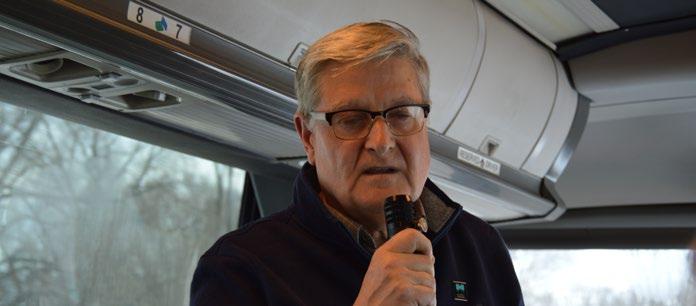
MARCH - APRIL - 2024 - Soybean Business - 23
Kittson County farmer Chuck Dziengel tells jokes to help pass the time during the long trip down south.
Checkoff Sponsorships
Hartel and Dufault are always passing around snacks. Peanuts, M&M’s, Triscuits and a fine selection of meats and cheeses make the rounds throughout the trip, along with a diverse selection of soft drinks. Plus, there are a couple stops along the way for bathroom breaks, stretching legs, grabbing more snacks or buying about $50 worth of lottery tickets, as one northern Minnesota farmer did.
Along with fun and games, the trip also serves as a learning opportunity. Some years on the bus, it’s not uncommon for an openmic update of sorts from some of the farmer leaders on board, providing an opportunity to hear about the latest policy and checkoff news from Minnesota Soybean and Minnesota Corn.
“It just shows how passionate these
guys and gals are about agriculture,” said Hartel. “Even on the way down to Ag Expo they’re promoting what they’re doing and what they’re working on.”
Beyond the convenience, it’s the trip itself and the stories created that seem to keep the characters coming back year after year. Most everyone on the bus is a repeat traveler and recount numerous stories of year’s past.
But not every year on the bus is a smooth ride.
“One year we ran out of gas. Well, the driver said the bus gelled up but there was enough makeshift farm mechanics, and we were convinced it ran out of gas,” Dziengel said. “Then there was the year we blew a tire on the way home…”
For other passengers, such as Norman County’s Corey Hanson,
their favorite part of the experience is the connections they make with those on board.
“It’s nice to get to know some of the people a little better outside of board meetings and the other few times a year we cross paths,” said Hanson, a director with the Minnesota Soybean Growers Association. “You sit next to a person on a bus for five hours and you get to know them pretty well.”
Oh, and if five hours on a bus together wasn’t enough: The riders on the Ag Expo bus all gathered for supper at the hotel after arriving in Mankato, which is a true testament to the friendships that have been built along the way.
Within 48 hours, growers are back on the bus for the trek home to the north country. The caravan will return to Mankato for the 2025 MN Ag Expo Jan. 22-23, 2025.
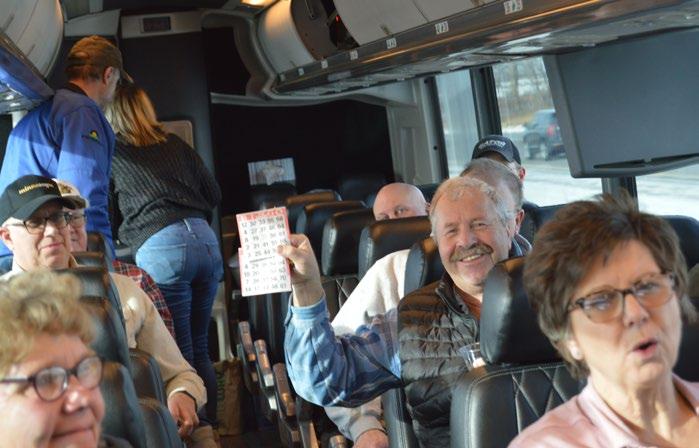
24 - Soybean Business - MARCH - APRIL - 2024
Bingo! Norman County farmer David Swenson was the lucky winner on the northern bus.
BELIEVE YOU CAN.
FOR WE LIVE BY FAITH, NOT BY SIGHT.
II CORINTHIANS 5 : 7

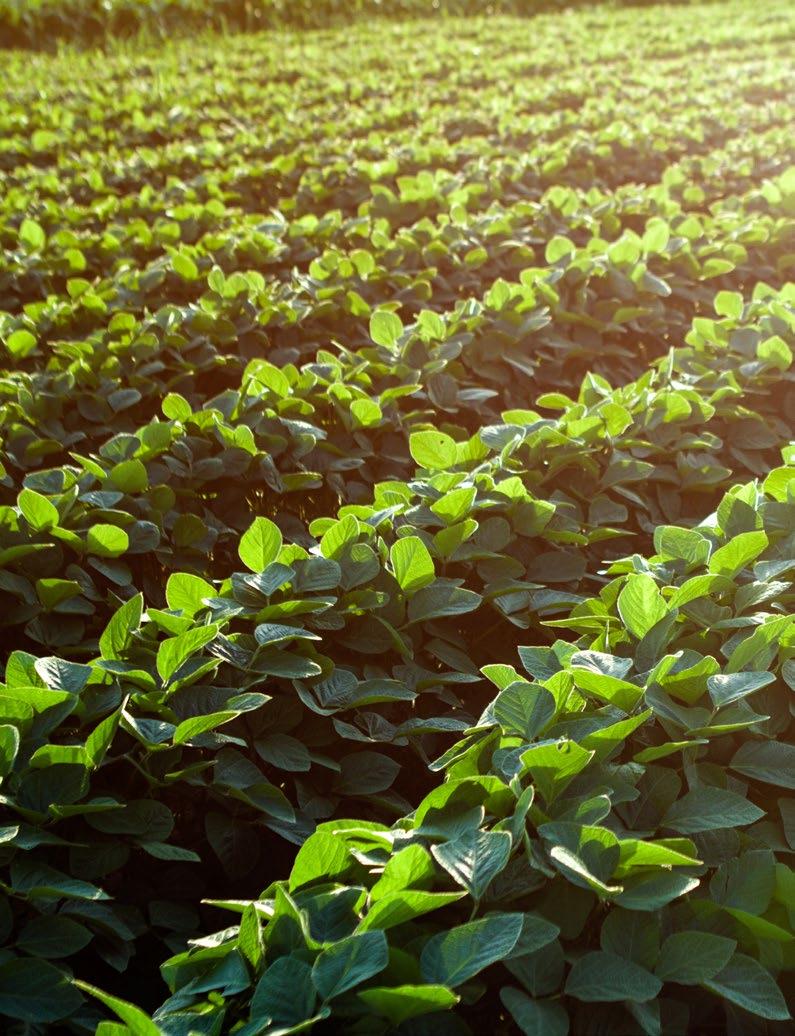
BEAN BALLOT BOX
Meet the MN farmers running to direct soy checkoff resources
By Soybean Business Staff
The Minnesota Soybean Research & Promotion Council (MSR&PC) is holding its annual election this spring. For the past few months, the Council has been seeking candidates to fill five seats. Longtime Directors Jim Willers and Kris Folland are stepping down when their respective terms end this summer. Look for tributes to Willers and Folland’s dedication to the soybean industry in the May-June issue of Soybean Business.
“It’s an exciting time at the Council, as we bid farewell to two strong directors who left a big impact on our organization,” Council Vice Chair Gail Donkers said. “At the same time, we’re excited to welcome Jim and Kris’ replacements on the Council as we look toward 2025 and beyond.”
MSR&PC directors serve three-year terms, beginning July 1. The 15 elected farmers wisely direct the investments of soybean checkoff money into developing new uses for soybeans, expanding markets, researching new production practices and technologies and promoting the diverse uses of soybeans – all with an eye on improving profitability for Minnesota’s nearly 28,000 soybean farmers.
The Minnesota Department of Agriculture, which oversees the election, will mail ballots by March 15 to farmers who have voted in past MSR&PC elections or who requested a ballot. Ballots are due back to MDA by April 1. No ballots will be accepted postmarked after April 1.
But first things first, let’s get to know the candidates running for the Council seats up for election.
DECADES OF GROWTH
The national soybean checkoff program was created and is still administered under the authority of the Soybean Promotion, Research, and Consumer Information Act (SPARC), which Congress passed in 1990. It became effective on July 9, 1991, when the Soybean Promotion and Research Order was published. Assessments began Sept. 1, 1991. Checkoff dollars can’t be used for legislative purposes, but after 30 years of investments, the checkoff helps the soybean industry contribute a yearly average of $115.8 billion in total economic impact on the U.S. economy.
Producers see the benefits of the checkoff, too. According to the most recent checkoff referendum, among the more than 500,000 soybean farmers in the U.S., only about 700 famers (.001%) elected to terminate the checkoff, well below the required threshold.
DID YOU KNOW?
Minnesota’s statewide, halfcent checkoff was passed with a 75% majority in 1973. That same year, MSR&PC held its first meeting. Today, half of the state’s soybean checkoff funds stay in Minnesota. The other half is invested by the United Soybean Board.
26 - Soybean Business - MARCH - APRIL - 2024
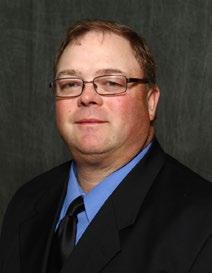
Corey grows soybeans, corn and alfalfa on a cow/calf operation. He is a current director with the Minnesota Soybean Growers Association (MSGA) and serves as president of the Norman County Corn & Soybean Growers Board.
On the Council, Corey says:
I want to help Minnesota farmers understand how soy checkoff dollars work to benefit our state’s farmers, along with showing the differences between MSGA and MSR&PC. It’s very important that the checkoff stays out of the legislative arena, and as a longtime MSGA advocate and county-level president, I have a firm grasp of when and how the checkoff and policy worlds can (and cannot) work together.
I’ve been proud to represent Norman County on MSGA and it would be a privilege to represent farmers in my district, along with the entire state, in directing these valuable soy checkoff funds toward increasing profitability, opening new markets, developing value-added uses and addressing production challenges affecting producers across the state.
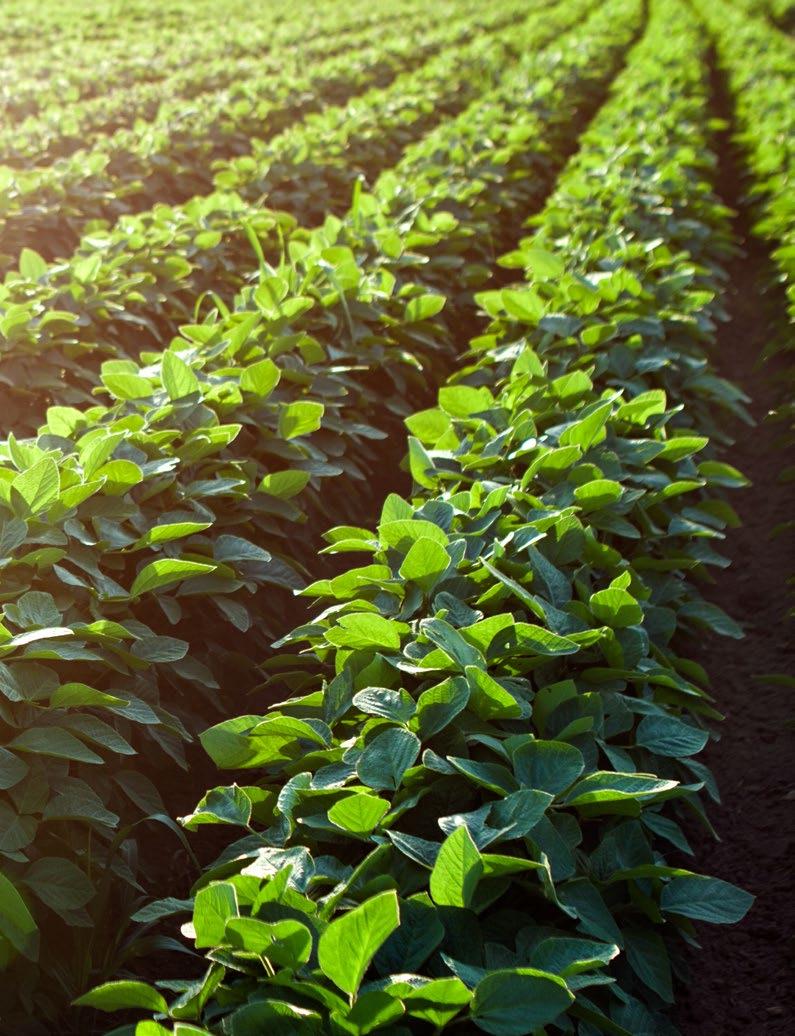
Paul grows soybeans, corn and wheat. He’s a former director and past president with MSGA. He’s also a member of Sacred Heart Church and Knights of Columbus; the Upper Mississippi Waterway Association (past chair); and is the Council’s representative on the Agriculture Research, Education, Extension and Technology Transfer (AGREET) Oversight Board. Paul is enrolled in the Minnesota Agriculture Water Quality Certification Program (MAWQCP) and previously represented MSGA on the MAWQCP Advisory Board.
On the Council, Paul says:
The past three years I’ve had the pleasure to serve on MSR&PC and it has been very gratifying to see and understand the wide range of benefits this wise investment brings to Minnesota soybean farmers. In my small corner of the world, I’ve tried to be an early adopter of new concepts and technologies; solid research gives farmers the path to move forward. By adopting and promoting new concepts and technologies, change can be seen throughout the world. As in any venture, return on investment must be considered. In my short time on the Council, I’ve witnessed the progress and can see the many ways that one half of one percent we pay into the checkoff returns many times in value to the producer, thanks in part to the Council’s investments. I would like to continue to guide the Council for my peers on Minnesota farms. Continued on page 28
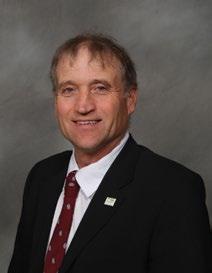 District 1, 2 & 3
Corey Hanson
Gary, Minn., Norman County
District 4
Paul Freeman
Fergus Falls, Minn., Pope County
District 1, 2 & 3
Corey Hanson
Gary, Minn., Norman County
District 4
Paul Freeman
Fergus Falls, Minn., Pope County
MARCH - APRIL - 2024 - Soybean Business - 27 Checkoff Election
District 7
Joel Schreurs
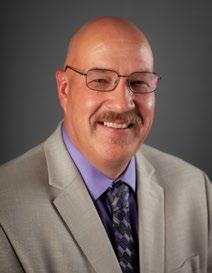
Tyler, Minn., Lincoln County
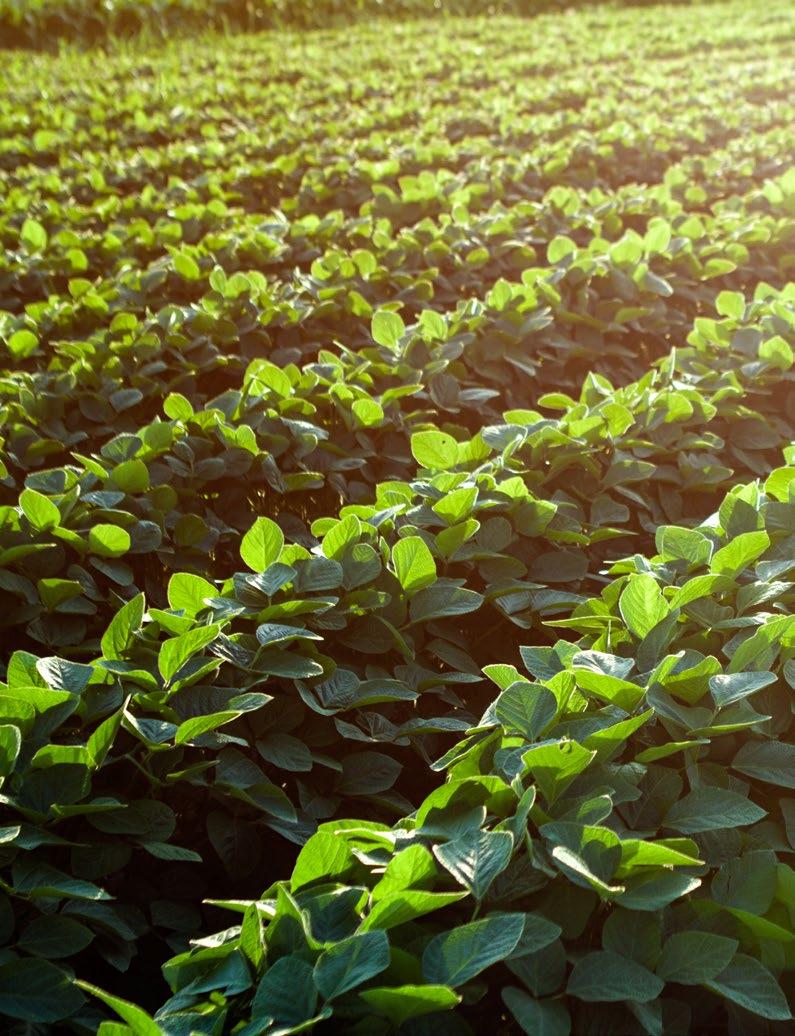
Joel raises soybeans, corn and alfalfa with his daughter and son-in-law. A longtime farmer leader, he serves on numerous agriculture boards, including the Lincoln County Corn and Soybean Growers Association, MSGA, the U.S. Soybean Export Council (USSEC) and recently termed off the American Soybean Association after nine years of advocacy. Joel is also a past vice chair of the Soy Transportation Coalition.
On the Council, Joel says:
I have been a longtime advocate of the soybean industry and agriculture. I’ve served on my county board for 15 years and MSGA for 14 years and four years on USSEC.
I have a lot of experience in the soybean industry. I have the time it takes to be a good contributing member of the board. I have a very large network of relationships that I have built in the soybean industry that I can draw from.
The soybean industry is quite complex, and it would be very difficult to be an expert on every issue. With that being said, my background has been in export markets and trade policy in both state and national governments. In this new role within the checkoff, I believe my extensive background will be an asset to the Council and my fellow soybean farmers. With the help of the other board members on MSR&PC, I
believe we can invest your checkoff dollars wisely.
Cole raises soybeans, corn, hogs and cattle on his family farm. He is the Council’s current District 8 director and previously served two years as chair. Cole is a member of MSGA, the Minnesota Corn Growers Association and St. Johns Evangelical Lutheran Church in Sleepy Eye. He also serves on the Farmward Cooperative Board.
On the Council, Cole says:
It has been an honor to serve on the Minnesota Soybean Research & Promotion Council for the past several years, and I would appreciate the opportunity to continue with another term. I believe that the collaboration between MSR&PC and MSGA makes this one of the leading ag organizations in the state, and it is a fun organization to be a part of. We have successfully faced many challenges in the past and will continue to do so into the future.
Minnesota Soybean works hard to help all soybean farmers through investing in research to improve yield, quality and environmental issues, as well as working on improving markets at home and around the world. I would be honored to continue to serve on the board of directors and
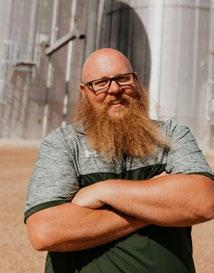
District 8
Cole Trebesch
Springfield, Minn., Brown County
28 - Soybean Business - MARCH - APRIL - 2024
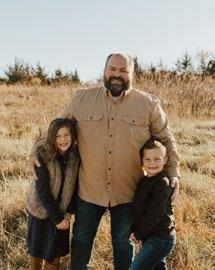
Cottonwood County
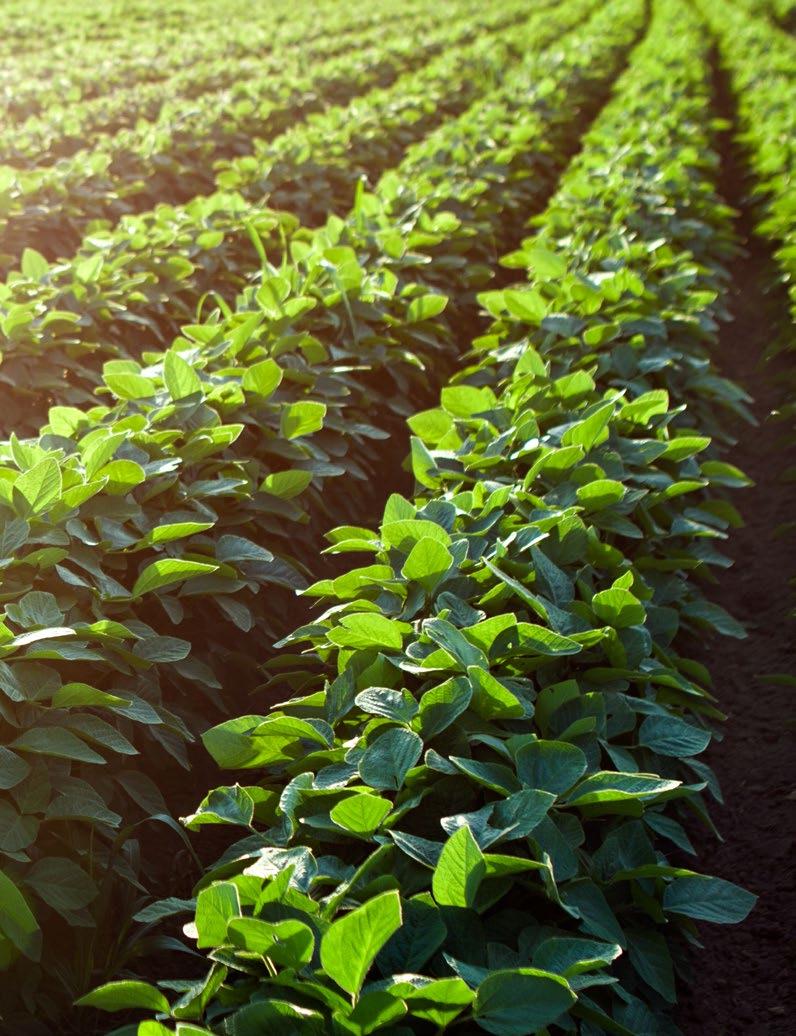
help direct checkoff investments.
Scott lives in Kasota but raises soybeans and corn in Cottonwood County. He is a member of MSGA, the Minnesota Crop Production Retailers, graduated from the Minnesota Agricultural & Rural Leadership (MARL) program and has served on the Nicollet Conservation Club since 2013.
On the Council, Scott says:
The soybean market is a world market. We need to be able to identify new markets and opportunities for our growers. I would appreciate the opportunity to be a part of this board to help share what the Minnesota Soybean Research & Promotion Council stands for and does to help farmers. I have been impressed with what they have accomplished and the great events they support.
Being a member of MARL Class XII, I have learned it is vital for these organizations to promote soybeans and soybean growers from this great state creating new and exciting opportunities, along with educating those about what a great crop soybeans are and what all they can be used for. With the list of great accomplishments already, I can’t wait to
see what the future has in store!
Ben raises corn, soybeans, oats and hogs on his family farm. He is a member of Minnesota Farm Bureau, MCGA, MSGA, St. Matthews Church and the Compeer Financial Nominating Committee and serves as chair of the Olmsted-Wabasha Corn and Soybean Growers Association. Ben is also enrolled in the MAWQCP.
On the Council, Ben says:
I have been serving on the Council now for two terms, I am seeking reelection for a third term. I would like to continue to serve on the research and promotion board because in my time on the Council, we have started some exciting projects and I would like to see them through. It has been a great learning experience, and I would greatly appreciate the opportunity to continue to serve Minnesota’s soybean growers in the proper use of their checkoff dollars.
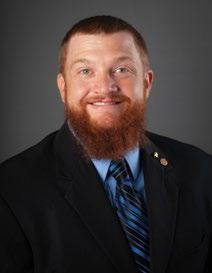 District 8
Scott Schoper
District 9
Ben Storm
Dover, Minn., Olmsted County
District 8
Scott Schoper
District 9
Ben Storm
Dover, Minn., Olmsted County
MARCH - APRIL - 2024 - Soybean Business - 29
By Soybean Business Staff
From the recent Driving Soy and Stepping Up checkoff promotions to food donations to community partners, Minnesota Soybean’s county program makes investments at the local level. In between harvest and planting seasons, organized counties from across the state gathered for various events and meetings to set a positive tone for the year ahead.
Southwest Minnesota
In February, Minnesota FFA students gathered at Southwest Minnesota State University in Marshall for the annual Ag Bowl Scholarship Invitational. This competition allowed FFA members to participate in 18 career development events.
The Ag Bowl featured volunteer judges, including members from Lincoln and Redwood counties.
American Soybean Association Director George Goblish and Kim Neumann of Redwood County; Chase VanKeulen, Brad Verly and Erica Gervais of Lyon County; along with Lincoln County’s Bob Worth and Joel Schreurs all volunteered to judge at the
Winning in winter
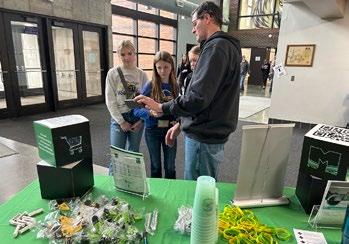
contest. FFA students will present to Lincoln County’s board in April.
“This group of young people were amazing,” Worth said. “They talked on a very difficult subject, which did surprise us as judges, but they did so well.”
30 - Soybean Business - MARCH - APRIL - 2024
During SMSU’s Ag Bowl, Lyon County Corn & Soybean Growers Board Director Ken Lanoue shows local students how the soy checkoff sets a firm foundation for the future.
Lyon and Murray’s county boards also participated. Lyon County used augmented reality to highlight the various ways the Council invests soybean checkoff funds over the long term. Minnesota Soybean Growers Association (MSGA) Director Bob Nelsen and his wife, Sally, along with board member and MSGA Director Paul Mesner, hosted a farm safety demonstration on behalf of Murray County.
Lincoln County held its annual meeting in February. On top of supporting MSGA, Lincoln County actively supports their local communities. Once again, a live auction was held to raise funds for education scholarships. In total, attendees helped raise $24,000 for area students.
This winter, Nicollet-Sibley County Corn & Soybean Growers continued their longstanding tradition of donating corn and soybean byproducts to local food shelves.
Soy and corn are everywhere in grocery stores –in Corn Flakes, Doritos, peanut butter, ChapStick, shampoo, dish soap and more. These products not only contain corn and soybeans but are also useful goods for the food shelves to have in stock.
The uses for both value-added commodities know no bounds.
“With this donation, we’re always so amazed at what byproducts contain corn and soybeans sometimes,” board member Kelsey Henke said. “This donation not only educates us at times, but also allows us to educate consumers about products that contain corn and soybeans.”
In total, the board donated about 400 items, equivalent to 440 pounds of food.
Olmsted-Wabasha County Corn & Soybean Growers gathered in Elgin for their annual meeting. Attendees heard updates from the board on how it supported agriculture and the community over the past year using soybean and corn checkoff funds. Local FFA advisors also spoke on the Minnesota license plate that benefits agriculture through 4-H and the state’s FFA.
The Watonwan County Corn & Soybean Growers Board drew in a crowd for their annual meeting on Feb. 5 featuring Madelia farmer and National Corn Growers Association (NCGA) President Harold Wolle. Wolle is also a member of MSGA. Board member and MSGA Director Mark Brown also delivered an update.
Central Minnesota
The young leaders in the Clay-Wilkin County soybean organization have stayed busy. From outreach at Hawley Breakfast on the Farm to donations to FFA programs and Farm Rescue and most recently their annual meeting in January at the Small Grains update in Dilworth. Their ambition was rewarded at MN Ag Expo when they were selected as MSGA’s County of the Year (see page 11).
In February, Douglas County held its annual meeting in which North Dakota State University Crops Economist Frayne Olson was the featured speaker. Counties including Kandiyohi and Lac qui Parle are currently putting together promotional campaigns to promote the many uses of soybeans. Thanks to soy checkoff investments, more than 1,000 soy-based products are commercially available.
Pope and Swift counties both made donations to the MiniSota Children’s Museum in Benson, which will take an agricultural approach to play and education. Swift County also donated $500 worth of hams to the Swift County Food Shelf to lend a helping hand to families in need during the 2023 holiday season.
Todd County was putting plans in place for their annual meeting in March and their Food and Fuel Days in Long Prairie in April. As part of the promotion, the board donates soy-based products to grocery store customers and offers generous discounts on biodiesel at the pump.
Continued on page 32
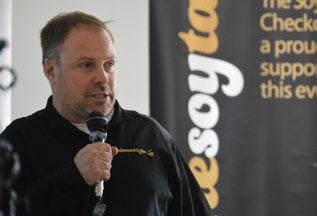
MARCH - APRIL - 2024 - Soybean Business - 31
Checkoff Promotions
MSGA Director Jeremy Tischer gives an update during ClayWilkin’s annual meeting at the Small Grains Update.
Northwest Minnesota
In January, Kittson County’s board convened for its annual meeting in conjunction with the Kittson County Crop Day and the Small Grain Update, with about 80 in attendance. Mike Hergert, co-founder of Red River Farm Network with a nearly 50-year career in radio and TV, served as keynote speaker. As past president of the National Association of Farm Broadcasting (NAFB) and a NAFB Hall of Famer, Hergert reflected on five decades of agriculture. Volatility in agriculture was Hergert’s theme.
Kittson County continues promoting soybeans in their county with print ads, appreciation supper for local farmers and ag in the classroom. The board retains one of the highest MSGA membership rates in the state.
Marshall County held its annual meeting in December 2023. University of Minnesota’s Angie Peltier (a soy checkoff-funded researcher), MSGA Director and Ag Innovation Campus Chair Mike Skaug and other special guests all delivered updates. The board has also donated grain rescue equipment to all nine fire departments within Marshall County. They continue to promote agriculture in the classroom and work with their local FFA chapters.
In January, Polk County hosted its annual meeting in
conjunction with the Small Grains Update at the University of Minnesota Crookston, bringing in about 40 farm families and industry professionals. The board has donated funds to Valley Corn Maize to help educate the public and provide fun for families. Other donations were made to the Mentor Fire & Rescue Department and Fisher and Fosston’s FFA chapter. The board is looking forward to holding soybean and corn trivia with radio stations in Fosston and Crookston during Ag Month in March.
Pennington–Red Lake County producers are holding their annual meeting in March. Outgoing MSR&PRC Director Kris Folland is giving a short agronomy presentation. The county continues helping the community through donations to local food shelves and promoting soybeans and corn via biofuels-related “Breathe Easy” signage throughout both counties.
Norman County held its annual meeting in January. The board recently received the Business Appreciation Award for outstanding contribution and support to Norman County’s 4-H program. The county works closely with KRJB Radio to promote soybeans and corn throughout the county. In addition to participating in Ag Month, the board donated funds to local food banks and the REACH program for food insecure families.
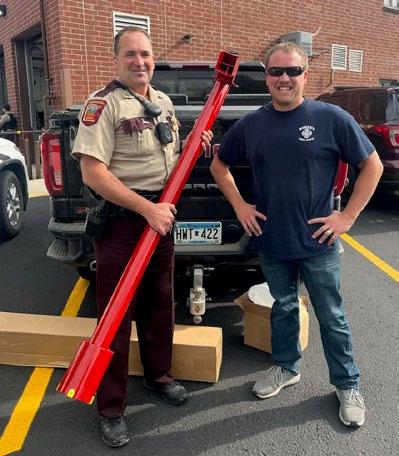
The Roseau–Lake of the Woods County Board held its annual meeting in early February in Roseau in conjunction with UMN’s Private Pesticide Training. Approximately 45 community members attended. Guest speakers from UMN included: Small Grains Specialist Jochum Wiersma, Peltier & Extension Educator Heather Dufault. Rep. John Burkel, who sits on the House Ag Committee, gave a policy update prior to the 2024 legislative session. The county board secured many sponsors for the event and donated to nine local fire departments, along with a ham donation to Northwest Community Action, while continuing to promote soybeans through radio.
32 - Soybean Business - MARCH - APRIL - 2024
On behalf of the Marshall County board, President Tony Johnson donates a grain bin rescue auger to State Trooper Shawn Rominski of the Stephen Fire Department.
HELPING YOU DELIVER ON DEMAND
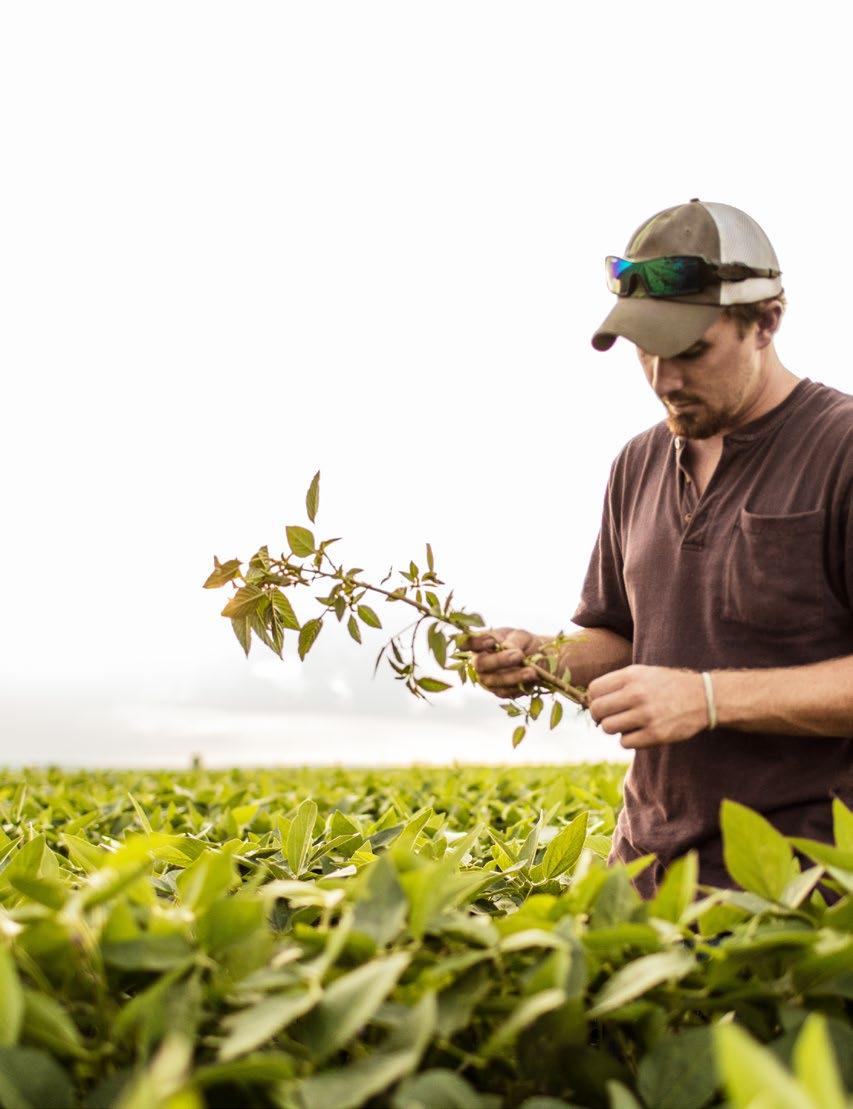
Whether it’s improving soybean meal to outperform the competition or promoting the sustainability of U.S. soy, the soy checkoff has been working behind the scenes to help farmers satisfy their customers’ needs. We’re looking inside the bean, beyond the bushel and around the world to keep preference for U.S. soy strong. And for U.S. soybean farmers like you, the impact is invaluable.
See more ways the soy checkoff is maximizing profit opportunities for farmers at unitedsoybean.org
unitedsoybean.org
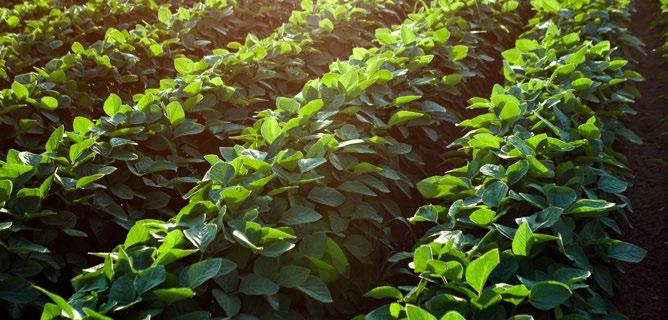 By Sydney Harris
By Sydney Harris
About 60 percent of the roughly 350 million bushels of soybeans grown in Minnesota are exported to international markets. Though China is the largest purchaser of Minnesota soybeans, the Minnesota Soybean Research & Promotion Council (MSR&PC) continues searching for new markets and routes to deliver the commodity from farm gate to end user.
In late January, MSR&PC Director Gene Stoel joined the Minnesota Department of Agriculture (MDA) and a team of Minnesota commodity groups on a trade mission to Morocco. While in Morocco, which is the only African country with a free trade agreement, the delegation stressed the superiority of U.S. soy, promoted the advantages of using the Port of Duluth-Superior and strengthened connections with the North African country.
“It’s all about building relationships,” Stoel said. “Everyone we talked to in Morocco wants to know where their product is coming from and wants to talk to the person that actually produces it.”
Morocco imported $182 million of soybean meal in 2023, making it the ninth-largest market for U.S. soybean meal. In light of recent efforts to expand the use of the Port of Duluth-Superior and Great Lakes St. Lawrence Seaway System, the Council has its eye on Morocco as a promising candidate for increased trade.
“Morocco has a lot of ports that are the same size as Duluth,” said Joe Smentek,
Africa’s Gateway
Council builds bonds with Moroccan buyers
executive director of the Minnesota Soybean Growers Association (MSGA), who attended the trade mission on behalf of the Council. “They also want a lot of mixed loads. There are a number of products that they want that Minnesota can offer, whether that’s DDGs (dried distillers grains), soymeal, beet pellets or corn. They aren’t a crush market so they don’t want whole soybeans; they’re usually looking for mixed loads and HansenMueller in Duluth can supply that.”
Trade, of course, is a two-way street. Because Morocco holds 77% of the world’s total phosphate reserves and is the world’s largest phosphate exporter, there is potential for increasing the phosphate imports entering the U.S. through the
Port of Duluth.
“There was a representative from the Port of Duluth with us and she is trying to ship soybean meal out of Duluth and bring phosphate fertilizer back into the port, which would be a huge boom to Minnesota farmers,” Stoel said.
European Union regulations could throw another variable into the mix.
“What we see going on in the European Union countries, like France, which are exporters to Morocco of commodities such as wheat, is that their environmental policies could change their exports,” Smentek said. “So not only could France become an importer but somebody’s going to have to step up and fill the markets that they’re exporting to

34 - Soybean Business - MARCH - APRIL - 2024
The Minnesota trade delegation visits with Ambassador Puneet Talwar (front middle) at the U.S. Embassy & Consulates in Morocco.
now. Duluth puts Minnesota in a great place to do that.”
‘A viable option’
The relationship between Minnesota and Morocco has strengthened over the years.
“Morocco has a longstanding history with the University of Minnesota; a lot of their animal nutrition experts actually attended the University of Minnesota,” Smentek said. “They understand the value of buying from the U.S. versus other places – they understand the quality of U.S. soy. So, they’re interested in looking at ways they can increase the importation of U.S. soy into their country because there is a preference there for it.”

Smentek first visited Morocco with MDA in 2023 as part of the Council’s “sweat equity” projects to grow emerging markets. A Moroccan delegation followed up with a visit to Minnesota in May 2023, when the Council co-hosted a visit to the Port of Duluth-Superior and the Hansen-Mueller Terminal.
Minnesota soybean farmers are fortunate to have strong organizations supporting their industry. With MSR&PC wisely directing soybean checkoff investments, MSGA successfully advocating for increased resources for MDA’s international program and MDA working to strengthen the agriculture economy, trade missions across the globe are helping to build new markets for growers across the state.
“It was a very good trip,” Stoel said. “MDA is just so interested in making sure they’re promoting Minnesota products. They do an excellent job. We wouldn’t be where we are without that group.”
MDA Commissioner Thom Petersen, who led the delegation, deemed the trade mission a success. The department and the Council are already planning a return visit to Morocco later this year.
Checkoff Trade Mission
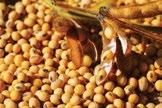




“Trade missions are the gifts that keep on giving,” Commissioner Petersen said. “We want people to know that Minnesota is a viable option, that we want their business.”
Morocco is the fourthlargest economy in Africa, with a population expected to reach 46 billion by 2025. Morocco is the largest importer of soybean meal in the Middle East and North Africa; the country has a strong preference for U.S. Soy’s high quality and supply. U.S. Soy has had a footprint in Morocco since 1995, and Morocco’s growing aquaculture industry bodes well for continued demand for U.S. Soy.
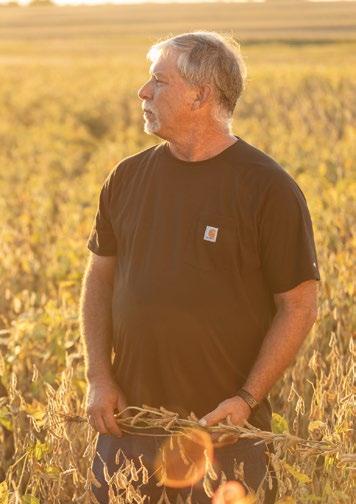

MARCH - APRIL - 2024 - Soybean Business - 35
Changing the Conversation
Council director teaches new habits during NSM trade mission
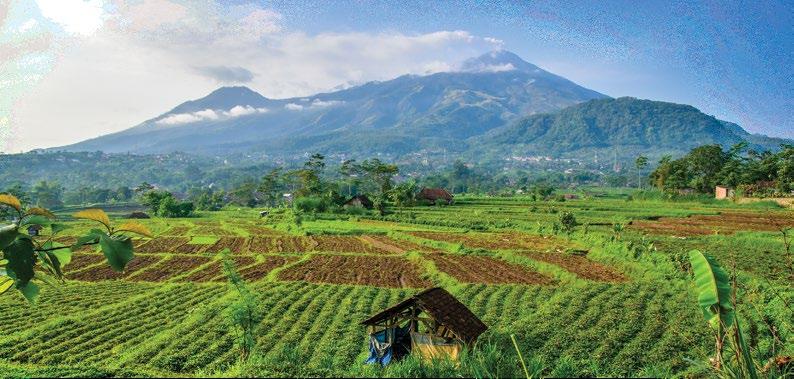 By Sydney Harris
By Sydney Harris
Sometimes, old habits are hard to break.
In the soybean industry, one of the purchasing habits that Northern Soy Marketing (NSM) is aiming to change is basing soybean and soybean meal (SBM) purchases solely on crude protein. An NSM delegation visited Vietnam in January 2024 to continue working toward a long-term goal of making critical amino acid value, measured by near-infrared spectroscopy (NIR), the industry standard for assessing protein quality.
“Before I get too old, I would love to see the day that soybean meal is bought and sold based on NIR analysis,” said Bob Swick, a poultry nutrition consultant who joined NSM in Vietnam. “Eventually, I hope people find value based on the digestible amino acids, not just protein, fat and fiber. And the quality of the soybean meal starts with the whole bean.”
Patrick O’Leary, NSM chair and a director with the Minnesota Soybean Research & Promotion Council, helped lead the mission and called attention to the superior quality of soybeans grown throughout NSM’s region.
“The five state soybean checkoff boards that comprise NSM – Minnesota, North Dakota, South Dakota, Nebraska and Wisconsin – produce roughly 25-28 percent of the total soy production in the U.S.,” said O’Leary, who farms in Benson. “Though our beans may have slightly lower crude protein content compared to other countries, they have a better amino acid profile and low foreign material. They’re some of the best quality soybeans in the world.”
Nebraska farmer and NSM Director Eugene Goering and
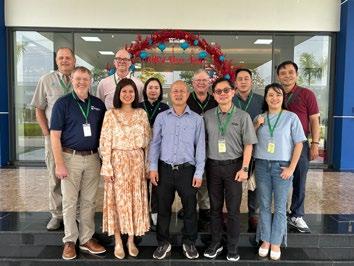
As
University of Minnesota Researcher Seth Naeve were also part of the delegation. The group visited Dabaco, which specializes in animal feed, poultry breeding and food processing, as well as Vinh Hoan/Feed One, an aquaculture company. Along with explaining the highlights from the 2023 U.S. Annual Soy Quality Report, Naeve described problems with using crude protein as the standard measure of quality.
“Traditional grading systems have been utilized for more than 100 years,” Naeve said. “The first researchers measured a lot of different plant tissues and determined that the average nitrogen composition of those proteins were around 16 percent. … We’ve imposed this on everything and have this universal measure. For better or for worse, we have adopted the current term crude protein because it’s not a perfect measure of protein but an indirect measure.”
Purchasing based on critical amino acid value rather than crude protein wasn’t the only prevalent message during NSM’s meetings and “Understanding U.S. Soy Quality Seminar,” which were held in Hanoi and Ho Chi Minh City.
“In the U.S., we have a very strong demand for soybean oil, driven by the renewable fuel and sustainable aviation fuel industry,” O’Leary said. “So, we are going to have an increased supply of soybean meal, and we’ll need to double our soybean meal export market. Meaning, high-quality U.S. soybean meal will be available at competitive prices.”
During a March trip to Indonesia, NSM will continue painting a more accurate picture of soybean protein quality to international producers, buyers and nutritionists.
Unlocking knowledge of soy quality
a founding member of NSM, the Minnesota Soybean Research & Promotion Council invests soybean checkoff dollars to expand the market in Southeast Asia for northern-grown soybeans, especially those leaving the U.S. from Pacific Northwest ports.
Checkoff Trade Mission

SELL YOUR EQUIPMENT WITH STEFFES Visit SteffesGroup.com for more information!
BOLD Investments
38 - Soybean Business - MARCH - APRIL - 2024
Minnesota Soybean s 2023 Annual Report
BOLD leadership
In our industry, bold investments happen when a diverse board appreciates the true purpose of soy checkoff funding. Our state’s soybean farmers are truly blessed to have a bold Minnesota Soybean Research & Promotion Council that thinks outside the box. Whether we’re creating new processing opportunities through the Ag Innovation Campus, reducing processing costs or enhancing animal agriculture, the Council has proven countless times that to go big, you better be bold every step of the way.
As lead staff of the Council for nearly 12 years, I’m very proud that this board is comfortable in taking risks without being reckless; our directors are involved to make sure that the decisions made on checkoff investments are watched closely, but also done in a way that allows for freedom for us to operate and take the road less traveled.
In 2024, we’ll continue watching over the investments that have been made in these arenas, but with patience and recognition that many checkoff projects take time. We continue steadfast in our boldness based on the successes the Council has earned over the decades. In the year ahead, expect us to continue taking further steps in creating new trade markets through the Great Lakes St. Lawrence Seaway System, along with working to a grow an up-and-coming market in Uzbekistan, which had never purchased U.S. soybean meal prior to the Council’s outreach. Closer to our home turf, we’re making further investments into value-added products, cutting-edge research and promoting our renewable fuels.
Times are rapidly changing, and we must adapt alongside them. With Minnesota leading the charge – and through collaborations with state and national groups – we’re taking bold strides toward improving farmer profitability.
Tom Slunecka CEO, Minnesota Soybean Research & Promotion Council
MARCH - APRIL - 2024 - Soybean Business - 39
table of CONTENTS 52.
42. Board of DIRECTORS a BOLD leap into the future
6.
8. 40 - Soybean Business - MARCH - APRIL - 2024
Letter from the CHAIR BOLDLY building the next generation Being BOLD Abroad BOLD ideas. Big Results. BOLD ideas. forward thinking 44. 50. 51. 4
4
a BOLD new Direction 54.
BOLD on the waterways
BOLD Move East BOLD PArtnerships Being BOLD statewide FY23 FINANCIALS Built BOLDY
56. 58.
62. 64.
MARCH - APRIL - 2024 - Soybean Business - 41
60. 61.








Board of DIRECTORS Tom Frisch (Chair)* District 4 Dumont, MN 320-808-1002 TFrisch@mnsoybean.com Gail Donkers (Vice Chair) District 8 Faribault, MN 507-202-2042 GDonkers@mnsoybean.com Pat Sullivan (Secretary) District 5 & 6 Franklin, MN 320-894-5917 PSullivan@mnsoybean.com Ben Storm (Treasurer) District 9 Dover, MN 507-993-4623 BStorm@mnsoybean.com Bill Zurn District 1-2 & 3 Callaway, MN 218-849-5289 BZurn@mnsoybean.com Patrick O’Leary District 4 Benson, MN 320-760-5335 PO’Leary@mnsoybean.com Kris Folland District 1-2 & 3 Halma, MN 218-791-2156 KFolland@mnsoybean.com Joe Serbus District 5 & 6 Bird Island, MN 507-828-7869 JSerbus@mnsoybean.com 42 - Soybean Business - MARCH - APRIL - 2024








*United Soybean Board Director
Paul Freeman District 4 Starbuck, MN 320-290-9224 PFreeman@mnsoybean.com
Jim Willers* District 7 Luverne, MN 507-227-3725 JWillers@mnsoybean.com
Ron Obermoller District 7 Brewster, MN 507-360-4863 RObermoller@mnsoybean.com
Rochelle Krusemark District 8 Sherburn, MN 507-236-3625 RKrusemark@mnsoybean.com
Cole Trebesch District 8 Springfield, MN 507-227-3263 CTrebesch@mnsoybean.com
Glen Groth District 9 Ridgeway, MN 507-459-1956 GGroth@mnsoybean.com
Gene Stoel* District 7 Lake Wilson, MN 507-879-3483 GStoel@mnsoybean.com
MARCH - APRIL - 2024 - Soybean Business - 43
Lawrence Sukalski* USB Director only Fairmont, MN 507-236-4880 sukallnd@hotmail.com
a YEAR of BOLD Moves.
Fifty years since we held our first board meeting, the soy checkoff continues taking bold strides in the research, promotion and education of Minnesota-grown soybeans. 2023 was no exception.
This year, the checkoff made advances in new export markets, including Uzbekistan and Morocco. We also weren’t afraid to take the road less traveled by partaking in a “See for Yourself” mission to Halifax, Nova Scotia, exploring the possibilities of expanding the use of the Port of DuluthSuperior and St. Lawrence Seaway.
Not only did our checkoff investments make bold moves across the world, but in Minnesota, too. In 2023 we saw the completion of the first phase of the Ag Innovation Campus, introduced augmented reality as a digital tool and funded 35 agronomic research projects. And, as the only state with
44 - Soybean Business - MARCH - APRIL - 2024
an organized county program, Minnesota builds off a grassroots foundation that boldly sets us apart within the soybean industry. Minnesota soybean growers are bold – it’s only fitting that MSR&PC have a similar mindset. Our farmers place their livelihoods in the hands of factors out of their control – from Mother Nature’s whims to volatile markets – and trust our organization to invest soybean checkoff dollars wisely to increase their profitability.
We look forward to continuing being bold this next year. Just you watch!
Tom Frisch
MARCH - APRIL - 2024 - Soybean Business - 45
Chair, Minnesota Soybean Research & Promotion Council
Being BOLD Abroad.
Being bold means bringing beans beyond the borders. By developing international markets, the checkoff continues to be the building blocks to get more beans abroad through sponsorships, partnerships and memberships. In 2023, the checkoff supported 25 projects to break barriers, develop international relations and continue bringing Minnesota-origin soybeans to ports across the world.
46 - Soybean Business - MARCH - APRIL - 2024
As more crush facilities come online, the checkoff has supported the development of doubling the capacity of the Grays Harbor facility in the Pacific Northwest to aid in meeting the demand for international export opportunities.
The checkoff partnered with the Specialty Soya and Grains Alliance on nine projects in 2023, which focused on identity preserved soybeans and specialty grains
$8.16B
As a result of the checkoff partnering with the U.S. Meat Export Federation, the U.S. saw record pork exports to countries around the world.
9 MARCH - APRIL - 2024 - Soybean Business - 47
X2
BOLD idea.
BIG results.
In just five years, the Ag Innovation Campus blossomed from a bold idea to a big reality. The AIC – with soy checkoff support – launched production in 2023, culminating in a Grand Opening ceremony in Crookston. At full potential, the AIC will serve as part specialty crush facility, part research lab and office space, and part educational facility – propelling the soy checkoff toward a new future.
48 - Soybean Business - MARCH - APRIL - 2024
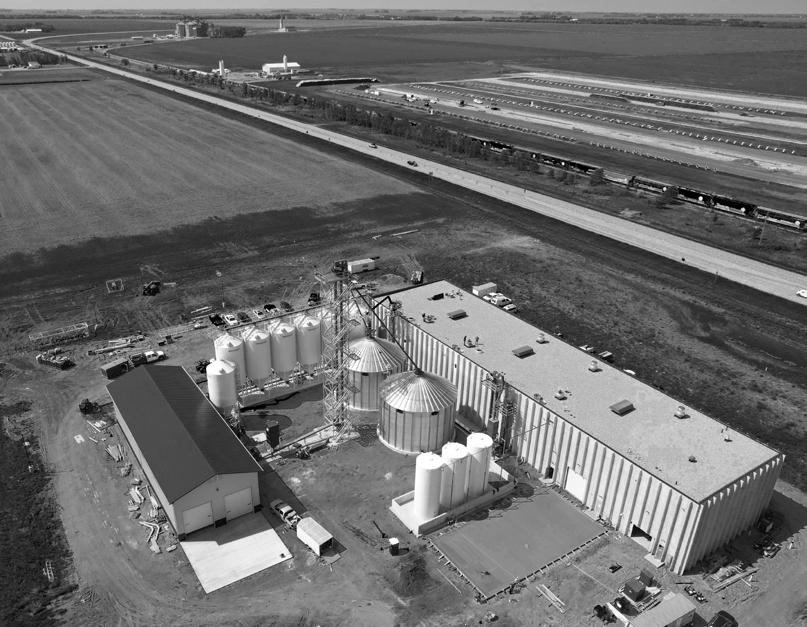
The non-for-profit, 16,000-square foot facility will operate 324 days yearly and produce an estimated 240 tons of soybean meal daily (about eight semi loads), equating to 62,400 tons of soybean meal per year.
MARCH - APRIL - 2024 - Soybean Business - 49
BOLDLY Building the NEXT Generation.
The checkoff is molding the next generation of agriculturists. From future leaders, farmers and ag industry professionals, our bold investments are building a strong prospective workforce.
This year, the checkoff funded a combined 4-H and FFA forage crop scouting event and the FFA plant science competition. In addition, the checkoff hosted the Minnesota FFA state officers and staff at their headquarters and gave a “Soybeans 101” course on how our organization works to improve farmer profitability.
50 - Soybean Business - MARCH - APRIL - 2024
BOLD Ideas. FORWARD Thinking.
One-third of the production research projects funded in 2023 focused on future or potential agronomic threats. Through checkoff investments, this bold, proactive approach helps combat issues before they arise and digs deep to uncover answers today for questions that’ll be asked tomorrow.
In 2023, the Council funded 35 projects in three topic areas Pest management Genetics Other agronomy 17 4 14 MARCH - APRIL - 2024 - Soybean Business - 51
A BOLD leap into the FUTURE.
The soybean checkoff set its eyes to the future by developing two augmented reality farmers – Sandy and Paul – to showcase how today’s bold checkoff investments will have a lasting impact on tomorrow’s soybean farmers. The augmented reality digital tool was utilized through numerous events, social media, print publications and more.
52 - Soybean Business - MARCH - APRIL - 2024

MARCH - APRIL - 2024 - Soybean Business - 53
The augmented reality tool was first launched in August 2023 at the Minnesota Soybean booth during Farmfest.
A BOLD NEW direction.
With changes in the renewable fuel market bringing an increased demand for soy oil, the checkoff has shifted its focus to finding new markets and uses for soybean meal. By utilizing new technologies, the checkoff transforms familiar products into new opportunities, creating more value-added uses for soy. In 2023, the checkoff funded a variety of new soybean meal projects. Here’s a look at three up-and-coming bold innovations.
54 - Soybean Business - MARCH - APRIL - 2024
Biodegradable plastic from soybean hulls
Soybean meal horticultural fertilizer
MARCH - APRIL - 2024 - Soybean Business - 55
Soy 3-D edible printing ink
BOLD on the WATERWAYS.
In an industry stifled by supply chain issues and historically low levels on the Mississippi River, the checkoff looks for creative routes to deliver soy to developing markets. In 2023, grower leaders promoted exports via ports in Duluth and Halifax, Nova Scotia. In May 2023, the checkoff organization welcomed a team of Moroccan buyers to Duluth to take a closer look at the port’s capabilities. A few months later, MSR&PC participated in a See For Yourself mission to Halifax for a water-level view of export opportunities to Europe and North Africa.

56 - Soybean Business - MARCH - APRIL - 2024

The St. Lawrence Seaway, the “Opportunity Belt” that traverses 2,300 miles from the head of the Great Lakes in Duluth to the Atlantic Ocean, currently accounts for only about 2% of U.S. soybean exports.
MARCH - APRIL - 2024 - Soybean Business - 57
Being Statewide.
From Lake of the Woods to Luverne, the checkoff ’s unique county soybean program never runs out of bold ideas. Whether hosting a Soy Sunday Fun Day or donating grain bin rescue equipment, the checkoff organization’s 44 organized counties were on the frontlines in 2023, promoting soybeans throughout their local communities.
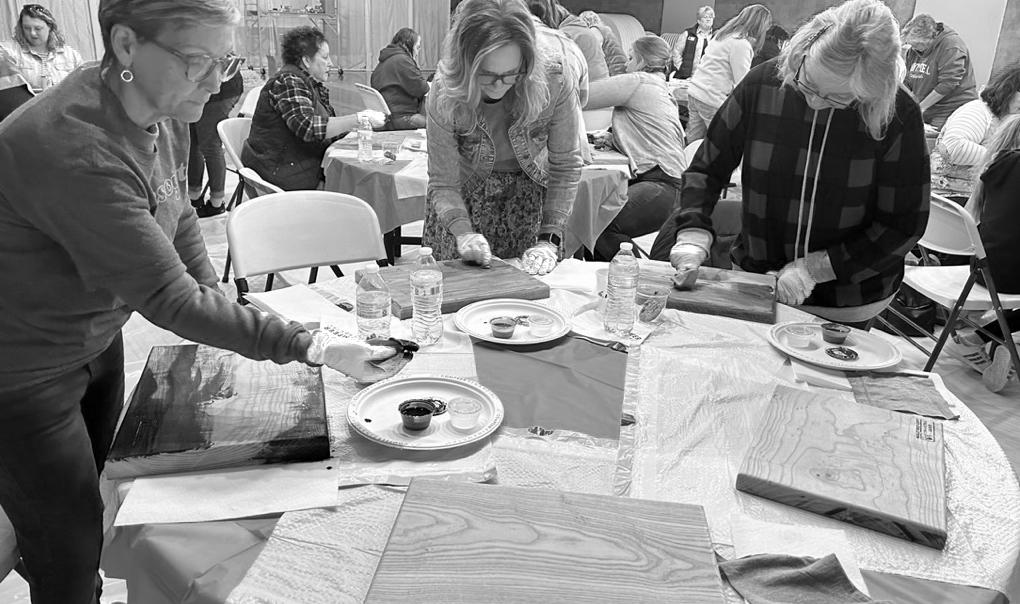
58 - Soybean Business - MARCH - APRIL - 2024

MARCH - APRIL - 2024 - Soybean Business - 59
Nicollet-Sibley County board members host a Soy Sunday Fun Day. Using soy-based stains, attendees had a variety of options to use for their charcuterie boards.
Built BOLDLY.
The checkoff is boldly building a high value marketplace with its continued work on TruSoya®, a high oleic, hearthealthy soybean variety. In 2023, 35 acres of the new seed variety was planted and harvested in Minnesota. To build on the groundbreaking investment, the variety was also processed for the first time at the Ag Innovation Campus in Crookston to progress research and testing.
60 - Soybean Business - MARCH - APRIL - 2024
BOLD partnerships.
Bold investments require bold partners, and that’s exactly what the checkoff has in Gopher Sports. Through its investment with the football and men’s basketball teams, the checkoff organization has been able to show the positive impacts biodiesel has on carbon reduction while shining a positive light on the soy innovations coming out of the University of Minnesota.
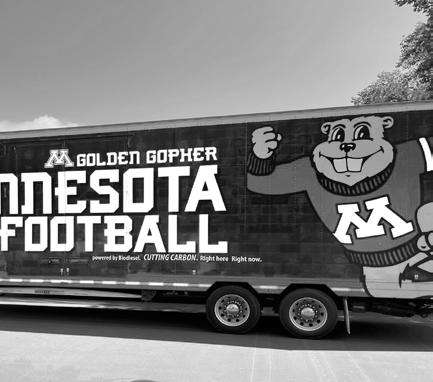
MARCH - APRIL - 2024 - Soybean Business - 61
BOLD Move EAST.
What’s bolder than going where few others have ventured?
Following the first shipment of U.S. soybean meal to Uzbekistan, the Council kicked off 2023 with a trade mission to the country. Since then, the checkoff ’s incountry representative has worked to expand trade between the two countries, especially through the Port of Duluth and St. Lawrence Seaway.
62 - Soybean Business - MARCH - APRIL - 2024
2020
Council makes initial checkoff investments to establish soy export markets to Uzbekistan.
Sept. 2022
Council leaders, including Directors Patrick O’Leary and Gene Stoel, embark on its maiden trade mission to Uzbekistan.
Aug. 2022
First-ever shipment of 700 metric tons of U.S. soybean meal was shipped to Uzbekistan.
MSR&PC continues nurturing relations with Uzbekistan through its in-country representative, Chris Andrew.
MARCH - APRIL - 2024 - Soybean Business - 63
2023
Management
$1,493,244
product development
$2,303401
$833,660
FY23 FINANCIALS
Influencer education 64 - Soybean Business - MARCH - APRIL - 2024
TOTAL EXPENSES
High impact
Communications
research
Annual Report of Program Area Expenditures
Fiscal year Sept. 1, 2022 - Aug. 31, 2023
Certified through an independent audit by the accounting firm of Schlenner Wenner & Co.
$1,841,817 $2,244,236 $3,402,986
Promotion $1,575,501
$13.69 M MARCH - APRIL - 2024 - Soybean Business - 65
‘Looking toward the future’: MAWQCP’s Area Certification Specialists assist growers
When farmers begin the enrollment process for the Minnesota Agricultural Water Quality Certification Program (MAWQCP), a team of Area Certification Specialists (ACS) are by their side every step of the way to help growers reach the necessary steps to become enrolled.
Glen Kajewski is an ACS with MAWQCP, based near Thief River Falls in northwest Minnesota. In total, MAWQCP supports 13 ACS across eight regions across the state.
“Farmers want to do what’s right for the land,” said Kajewski, who grew up on a dairy operation in Waseca County. “They’re looking toward the future, and the folks that come forward and want to get certified are showing that little bit extra interest.”
When a producer volunteers to become MAWQCP certified, they’re connected with an ACS such as Kajewski. The ACS will gather information on the operation and begin an evaluation,
The assessment tool the specialists follow typically involves evaluating:
• Physical field characteristics
• Nutrient management factors
• Tillage management factors
• Pest management practices
• Irrigation and tile drainage management
• Conservation practices
“It’s important to see those conservation practices they’re applying or using,” Kajewski said. “We’re looking at cover crops, grass waterways and those types of things that have a positive impact on water quality.”
Kajewski said he enjoys helping producers tweak and improve practices to become eligible without being intrusive.
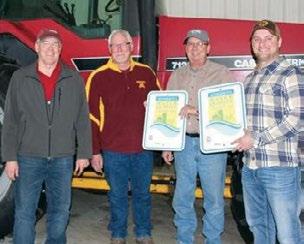
“I try to gather as much as I can behind the scenes before and after meeting the farmer,” he said. “I try to streamline it.”
When Minnesota Soybean Growers Association Director Mike Skaug, who farms in Beltrami, wanted to enroll in the MAWQCP, Kajewski and North Central ACS Jim Lahm helped guide him through the process.
“Glen and Jim really know their way around the program and helped me improve some practices on my farm,” Skaug said. “It was really a smooth process thanks to the area certification specialists.”
Since the voluntary program’s statewide launch in 2015, 1,436 producers totaling over 1,024,450 acres have been certified across Minnesota. Farms have added over 2,790 new conservation practices. Those new practices help reduce greenhouse gas emissions by over 50,000 metric tons each year and have kept nearly 48,000 tons of sediment out of Minnesota rivers while saving 142,000 tons of soil and 59,000 pounds of phosphorous on farms each year. The conservation practices have also reduced nitrogen loss up to 49%.
“Minnesota farmers are sending a message out to the public that we’re doing a good job, which to me is a huge positive,” Kajewski said.
Minnesota farmers can contact their local SWCD to apply for MAWQCP certification and then complete a series of steps with local certifiers using a 100% site-specific risk-assessment process. Specialists can also help farmers apply for financial assistance and MAWQCP’s Climate Smart Project.
“It’s a pretty impressive program overall,” Kajewski said, “and that extra funding support has become quite popular.”

After becoming certified, farmers receive a 10-year contract ensuring they will be considered in compliance with any new water quality laws, an official MAWQCP sign to display on their farm and other benefits.
Farmers and landowners interested in becoming water quality certified can contact their local SWCD or visit MyLandMyLegacy.com. Glen Kajewski can be reached at glen. kajewskieastpolk@gmail.com or by calling 218-689-1502.
“I really enjoy working with farmers,” Kajewski said. “I get to sit across the table from them and talk about our passion for doing the right thing for the land.”
Glen Kajewski (second to left) helped certify MSGA Director Mike Skaug’s (second to right) operation.

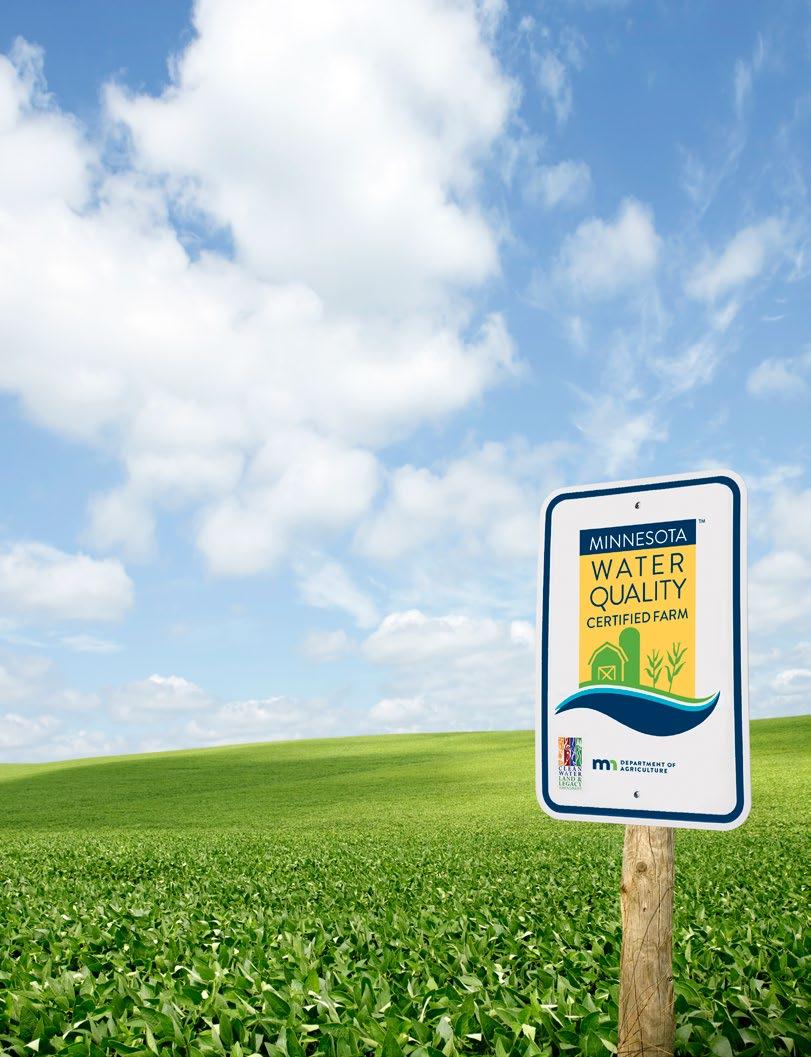
IT’S NOT JUST YOUR LAND. IT’S YOUR LEGACY. The Minnesota Agricultural Water Quality Certification Program rewards farmers like you for what you do best, taking care of your land and its natural resources. To get started and learn more, contact your local soil and water conservation district or go to: MyLandMyLegacy.com
Reaping benefits
How Minnesota’s fertilizer tonnage fee helps farmers, economy and environment

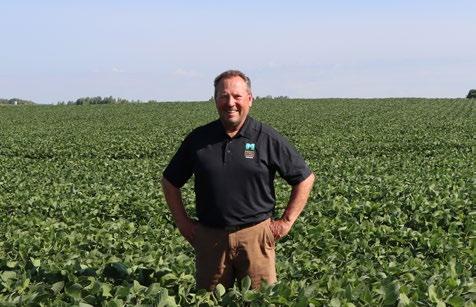 By Soybean Business Staff
By Soybean Business Staff
Most industry professionals in Minnesota agriculture are likely aware of the state’s fertilizer tonnage fee and the “AFREC” acronym. But what is AFREC and how does this producer-supported program continue benefiting Minnesota’s farmers, economy and environment?
AFREC stands for the Agricultural Fertilizer Research and Education Council. The program, which launched in 2008 through action from the Minnesota Legislature, is tasked with improving fertilizer efficiency, farm profitability and Minnesota’s environment through soil fertility research, technology development and education. Over the course of 15 years, AFFREC has invested $13 million in soil fertility and education across the state.
“To me as a soybean farmer, it’s important that AFREC is doing a lot of research on the fertilizer we’re using,” said Bob Lindeman, a director with the Minnesota Soybean Growers Association (MSGA) and an alternate member of AFREC’s board. “It’s a safeguard so we’re not applying too much. We’re being good for the environment, along with being economically sound.”
The Council comprises Minnesota farmers and crop advisors from each of the major agricultural groups in the state – including MSGA. Past MSGA Director Steve Commerford serves as AFREC’s secretary, while Minnesota Soybean Director of Research David Kee offers
technical staffing support.
“Steve has got his agronomy background and is able to ask some good questions,” Lindeman said. “David’s also a great resource. If I ever have any questions, he’s the guy to go to. There’s a lot of knowledge between those two.”
The Council discusses, approves and funds the research projects, which are mostly led by University of Minnesota scientists. That’s because land-grant researchers have the expertise, staff and equipment to conduct rigorous experiments, so farmers know they’re making crucial soil fertility decisions based on the best information possible. However, not all AFREC funding is directed by UMN researchers. Farmers, crop advisors and others can also apply at MNsoilfertility.com/grants.
Soybeans and soil fertility
U of M Extension Nutrient Management Specialist Dan Kaiser uses AFREC funding to improve the university’s fertilizer guidelines for soybeans (z.umn.edu/SoyFertilizer), especially when it comes to fertilizer application timing within a cornsoybean rotation.
“That’s one of the benefits of AFREC,” Kaiser said. “AFREC provides funding for more long-term plots to do some of this work.”
Kaiser’s research shows that applying fertilizer ahead of corn is likely the better option in a corn-soybean rotation. In his
sulfur projects, Kaiser has seen better soybean yield responses from the residual sulfur that’s left over after applying fertilizer ahead of corn compared to sulfur applied directly ahead of soybean.
“Soybean seems to be able to scavenge sulfur pretty well,” he added.
Fertilizing ahead of soybeans can also pose risks, as the plants may put too much energy into vegetative growth at the expense of seed production. When temperatures are high, a lot of water is needed to cool a larger canopy and there’s a higher chance of disease.
“More vegetative biomass isn’t necessarily the best thing,” Kaiser explained. “Some of my best yield increases have been situations where, visually, I couldn’t see any differences in biomass within the field, but it came through the combine at the end of the season.”
One exception where soybeans may benefit from fertilizer application directly ahead of the crop is phosphorus on high pH soils, Kaiser said.
Other soybean-related issues Kaiser focuses on include iron deficiency chlorosis (IDC), starter fertilizer and the economics of liming.
One of Kaiser’s top takeaways from the research he’s worked on?
“Don’t forget about soybean,” he said.
It’s all about return on investment.
“There are some good returns to be made with soybean, with some of the nutrient applications, as long as
68 - Soybean Business - MARCH - APRIL - 2024
Brownton farmer Bob Lindeman represents the Minnesota Soybean Growers Association as an alternate member of AFREC’s board alongside former MSGA Director Steve Commerfrod.

it’s accounted for at some point within the rotation,” Kaiser said. “Soybean makes a very good rotational crop for other crops because we get a marketable end product that generally can net a pretty high return – as long as you don’t overspend on inputs. When it comes to soybean, fertilizer is one of those things that’s pretty easy to overspend on.”

AFREC Investments By Topic
AFREC Investments By Topic
Nutrient Management
Helping farmers improve their nutrient use efficiency is key to producing more food with less impact on the
Staying ahead of the game
AFREC also supports educational programming so farmers can learn about how to apply researchers’ findings and recommendations to their operations. These efforts include:
• Minnesota’s annual Nitrogen Conference and Nutrient Management Conference
• AFREC’s website
• Minnesota Crop News blog posts
• Monthly episodes of the Nutrient Management Podcast
• U of M Extension videos
The Council’s funding comes from a 40-cent per ton fee on bulk fertilizer sales in Minnesota. Farmers in the state invest around five cents per cropland acre per year, raising more than $1 million each year. When the Legislature created AFREC in 2008, Minnesota became the 12th state to set up such a program. This authority is scheduled to sunset in June 2024, and associated Council functions are scheduled to sunset in June 2025. During the 2024 legislative session, AFREC and its advocates are seeking a 10-year extension of the program and the 40-cent per ton fee.
“We’ve been trying to put out a lot of reports and show that we’re doing more besides research; we’re also doing education,” Lindeman said. “We’ve been showing what AFREC is worth not just to the farmers, but to our communities and environment.”
Soil fertility research is valuable not just for farmers but for all Minnesotans – it affects our food supply, our economy, our drinking water and environment. AFREC research is key to helping Minnesota agriculture continue to move forward.
Soil Health & Water Quality
Minimizing nitrate loss to groundwater and surface water is crucial to maintaining clean water for all Minnesotans, from private well water to the lakes, streams and rivers that provide opportunities for fishing, boating and swimming.
Education & Outreach
Good research is only valuable if those that can use it know about it. AFREC funds conferences and communication efforts in order to educate farmers and crop consultants about key findings.
Other
On-farm research and precision agricultural technology are two tools AFREC invests in that reap many benefits.
Nutrient Management
Helping farmers use efficiency is more food with environment.
Soil Health & Minimizing nitrate and surface water maintaining clean Minnesotans, from to the lakes, streams opportunities for swimming.
Education & Outreach Good research is that can use it know funds conferences efforts in order crop consultants
Other On-farm research agricultural technology tools AFREC invests many benefits.
Timeline of Legislative Dates
Timeline of Legislative Dates and Achievements
“The fee is well worth the investments for the research projects we’re able to come up with,” Lindeman said. “We’re trying to think ahead and stay ahead of the ballgame.”
To me as a soybean farmer, it’s important that AFREC is doing a lot of research on the fertilizer we’re using. It’s a safeguard so we’re not applying too much. We’re being good for the environment, along with being economically sound.
-Bob Lindeman, MSGA directer
MARCH - APRIL - 2024 - Soybean Business - 69
continuation of the AFREC program. Minnesota is one of 14 states with a fee on fertilizer research. per ton fee on fertilizer sales in Minnesota funds AFREC. per acre per year net cost to farmers for AFREC program. invested in soil Minnesota since 2008. AFREC at a Glance 40¢ $13 MILLION ~$1,000,000 raised per year for soil fertility and water quality research, technology and education. 5¢ 246 PROJECTS FUNDED SINCE 2008
AFREC FACTSHEET FOR LEGISLATORS
MNsoilFertility.com/legislative
environment.
Nutrient Management Soil Health & Water Quality Education & Outreach Other 47% 29% 14% 9% 2000 2005 2010 2015 2020 2025 Ag Nutrient Task Force established through MN Legislature. Legislature creates AFREC without permanent funding. TEN YEAR MILESTONE $7.4 million invested into 147 projects. Authority to collect fees expires June 30, 2024. FIVE YEAR MILESTONE $2.83 million invested into 59 projects. Major legislative changes including removal of $800K cap. FIFTEEN YEAR MILESTONE $13.1 million invested into 246 projects Council authority expires June 2025. Permanent funding established at $0.40/ ton of fertilizer sold. Task Force recommends a “check off”type program. Concerns arise about maintaining up-to-date fertilizer recommendations.
Please see full report for legislative details. AFREC FACTSHEET FOR LEGISLATORS
Nutrient Management Soil Health & Water Quality Education & Outreach Other 47% 29% 14% 9% 2000 2005 2010 2015 Ag Nutrient Task Force established through MN Legislature. Legislature creates AFREC without permanent funding. TEN MILESTONE $7.4 invested into projects. FIVE YEAR MILESTONE $2.83 million invested into 59 projects. Major legislative changes including removal of $800K cap. Permanent funding established at $0.40/ ton of fertilizer sold. Task Force recommends a “check off”type program. Concerns arise about maintaining up-to-date fertilizer recommendations.
and Learn more about AFREC projects at MNsoilfertility.com.
and
alternate board member MSGA Advocacy
AFREC
PUSHING BACK AGAINST PESTS
Soy checkoff research helps farmers manage risks
By Mark Askelson
Pests, disease and other conditions were common throughout soybean fields in northwest Minnesota in 2023, according to a report given by University of Minnesota Extension’s Angie Peltier during this winter’s Small Grains Update. Highlighted during these meetings was some of the soy checkoffsupported research, funded by the Minnesota Soybean Research & Promotion Council (MSR&PC), including a study on white mold resistance and information on pest management.
Architectural resistance to white mold
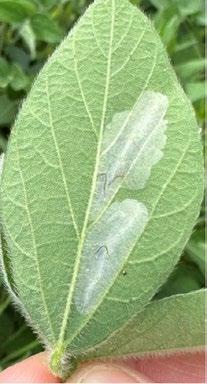
Could the structure of the soybean plant be important in assisting the crop to avoid infection by the fungus that causes white mold? During the Small Grains Update, Peltier highlighted a new study from Megan McCaghey’s lab at the University of Minnesota Department of Plant Pathology evaluating soybean varieties to identify genetic and architectural sources of resistance against the disease. White mold most commonly occurs because of wet and cool weather before and during flowering, with the devastating symptoms of plant wilt and death lagging behind infection. White mold often results in significant yield loss and is very difficult to manage.
“You can’t rotate out of it because other broadleaf crops are also susceptible, such as canola, sunflower and dry beans,” Peltier said. “Also, the fungus is able to survive in the soil for five or more years.”
The goal of this study is to define the relationship between canopy architecture and white mold development to be able to combine genetic resistance with avoidance. The study examined 20 different soybean breeding lines that were selected based on timing of canopy closure, plant architectural traits such as the petiole angle to the main stem and UVB light penetration.
“What the McCaghey lab is trying to find out is whether the plant’s structure, for example, an upright architecture with less canopy closure or narrower leaves, could help the crop to avoid white mold infections by allowing more sunlight and airflow toward the base of the plant where infection typically takes place,” Peltier said.
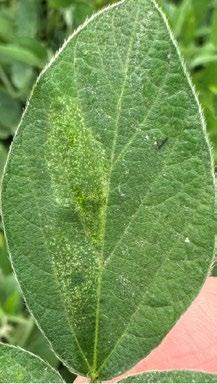
Observations from the first year initially show positive results. White mold occurred in an industry check variety with a bushy structure and not in an industry check variety with an upright structure. The McCaghey lab plans to repeat those trials in 2024 to determine whether the architecture traits they are studying are stable or vary with environment. Additionally, they plan to directly inoculate the same breeding lines over the winter in a greenhouse to determine whether any of these soybean breeding lines also have physiological resistance. The goal of the project is to eventually combine physiological and plant architecture-related avoidance traits into the same soybean variety to increase the overall level of white mold resistance.
Western MN IPM survey – a new pest
Scouts employed at UMN Extension offices, though with funds provided by MSR&PC, were spread across western Minnesota during the 2023 growing season to gather data on the incidence and severity of pests impacting soybean fields. Data that was collected found the usual suspects, such as grasshopper, bean leaf beetle, two-spotted spider mites and soybean aphid.
Soybean tentiform leafminer is a newer pest found for the first time in the U.S. in southeast Minnesota in 2021. It had originally fed on two native legume species but has now evolved to feed on soybeans as well. The leafminer larvae feed inside leaf mines that eventually become slightly raised or tented. These mines can sometimes be difficult to see from the top side of the leaf,
70 - Soybean Business - MARCH - APRIL - 2024
Figure 1: Mines formed by the soybean tentiform leafminer (left) are best observed on the underside of leaves. As feeding by the leafminer progresses, the upper leaf surface can become raised or tented (left). Photo: Angie Peltier, UMN Extension.
but are more easily recognized by the lighter colored blotches left on the back side of leaves (Figure 1).
“The area that is mined out essentially results in defoliation injury,” Peltier said. “There’s not as much photosynthesis occurring in leaves with mines and so yield loss may results.”
The northern and western-most county in which the soybean tentiform leafminer was found in 2023 was Marshall County in northwest Minnesota. The pest is thought to overwinter in leaf litter of wooded areas. This is supported by the fact that the two fields in Marshall County that had a soybean tentiform leafminer infestation were immediately adjacent to a wooded parcel of land. Peltier encouraged growers, particularly those with fields next to wooded land, to look for signs of the pest and pay extra attention to the backside of the leaves and the plants directly adjacent to the trees.
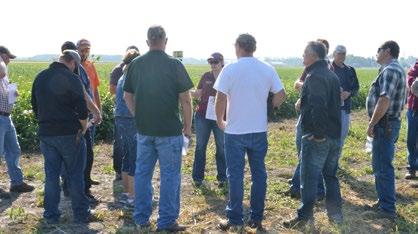
Dr. Robert Koch and Arthur Ribeiro, a postdoctoral researcher in Koch’s soybean entomology lab at UMN in St. Paul, are researching how much yield loss may be associated with soybean tentiform leafminer infestations and how best to protect soybean yield potential once a crop is infested.
Angie Peltier contributed to this article.











MARCH - APRIL - 2024 - Soybean Business - 71
Third party fees for internet, messaging, QR code scans, or data plans may apply. Loans are subject to credit and underwriting approval. Profinium Inc. NMLS# 402979 Member FDIC YOUR AG BANK THROUGH THICK AND THIN Contact Our Team For Customized Loan Options Garrett Schock VP - Ag/Business Banking Ian Bents Martin County President Taylor Nawrocki AVP – Ag/Business Banking Hunter Pederson Ag/Business Banker
Rank Ag/Business Banker
Kriener Ag/Business Banker Veronica Bruckhoff VP - Business Development Ronald D. Kopischke Chief Sales Officer NMLS# 798524 David Thamert SVP - Ag Banking https://www.profinium.com/agriculture/ tools-and-resources/meet-your-agriculture-banking-team Checkoff Research
Checkoff-supported researcher Angie Peltier visits with growers during a plot tour in Marshall County.
Christian
Kyle
MDA issues conditional registration for chlorpyrifos
The Minnesota Soybean Growers Association (MSGA) is pleased with the Minnesota Department of Agriculture’s (MDA) decision to provide conditional registration of chlorpyrifos pesticide products valid for the 2024 growing season. This conditional registration, which was signed by MDA Commissioner Thom Petersen, expires on Dec. 31, 2024.
MDA is reregistering products for the upcoming growing season after the U.S. Court of Appeals for the Eighth Circuit issued a November 2023 ruling vacating the U.S. Environmental Protection Agency’s (EPA) revocation of food and feed tolerances for chlorpyrifos and ordering the EPA to reconsider the use of the pesticide. MDA is also requiring product manufacturers to include MDA’s water quality best management practices for chlorpyrifos with each sale of the insecticide.
“All labels are meant to be used properly. That’s part of good stewardship for these products,” MSGA President Bob Worth said. “Now that we have it back, we have to make sure we’re using it safely, so we don’t lose chlorpyrifos in the future. Just follow the label to the T. That’s why the label is there. “
According to Josh Stamper, MDA’s division director of the Pesticide and Fertilizer Management Division, the department will continue to evaluate the use of chlorpyrifos in Minnesota as the EPA determines final steps on federal registration of the pesticide.
In February 2022, MSGA, the American Soybean Association and fellow agriculture groups brought the lawsuit against the EPA seeking to restore farmers’ ability to use this tool to protect crops.
MSGA cheers EPA’s dicamba decision
MSGA joined the American Soybean Association (ASA) and soy state affiliates in applauding the U.S. EPA’s decision to issue an existing stocks order for dicamba for the 2024 growing season.
The decision arrived after a court ruled on Feb. 6 that EPA made a procedural error in issuing 2020 dicamba registrations for over-the-top use on dicamba-tolerant soybeans and cotton. Working on behalf of its members, MSGA stayed active throughout the process. Following the ruling, farmer leaders and staff kept in close contact with legislative aides at the state and federal levels and EPA officials to underscore the importance of keeping dicamba available for growers. MSGA also joined ASA and state affiliates in drafting a letter to EPA urging clarity,
which the agency cited as justification for issuing the existing stocks order.
Soybean farmers from across Minnesota and the country depend on post-emergent dicamba to manage yield-robbing weeds, which have the potential to inflict more than $15 billion in damages to U.S. soybean crops if not properly managed.
“This is why it’s important to join MSGA,” Worth said. “We’re working every day on behalf of farmers, and we get results.”
In December 2023, MDA issued its state-specific guidelines for the 2024 growing season. The guidelines, which remain the same as 2023, resulted in a 90% decrease in alleged off-site movement onto neighboring property from its peak in 2021.
MN Soybean earns national recognition
The Minnesota Soybean Research & Promotion Council (MSR&PC and Minnesota Soybean Growers Association (MSGA) were both recognized at the National AgriMarketing Association’s (NAMA) Region 3 awards.
The Council, which directs the state’s soy checkoff, earned four awards, including:
• Minneline e-newsletter – First Place (copublished with MSGA)
• 2022 Annual Report – Merit
• 2023 Farmfest Booth – First Place
• Augmented Reality Future Farmers – First Place
Soybean Business submitted three issues and repeated as the winner of the Best Company and Association Magazines category. MSGA also was recognized for a March 2023 press release announcing it had joined a lawsuit challenging the state of Minnesota’s adoption of California’s zero-emission vehicle mandate.
All six of the Council and MSGA’s awards will be eligible for the national Best of NAMA in April in Kansas City, Mo.
The September-October 2023 edition of Soybean Business, which featured Council Chair Tom Frisch, was one of three issues submitted for the National Agri-Marketing Association (NAMA) awards.
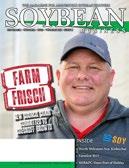
72 - Soybean Business - MARCH - APRIL - 2024

West-central MN farmer sought for checkoff-supported breeding program
The University of Minnesota (UMN) Soybean Breeding program, which is supported by the soy checkoff, is seeking a partnership with a west-central Minnesota soybean farmer to host a soybean variety trial. The area of land would be four-10 acres. The plot should be on level ground and of a soil type typical for the region. The partner would be paid $500 per acre or a total of $2,000, whichever is greater. Additionally, the researchers would include a small variety trial consisting of varieties of special interest to the host farmer if desired. If interested, contact UMN Professor Aaron Lorenz by email (lore049@umn.edu) or phone (612-625-6754).
Total US soy exports add $39.8 billion to US economy
U.S. Soy complex exports (whole soybean, soybean meal and soybean oil) added $39.8 billion to the U.S. economy in marketing year (MY) 22/23 on a volume of 67.6 million metric tons (MMT). The shining star: U.S. soybean meal exports broke records for both volume and value at 13.2 MMT and $6.91 billion, respectively.
US soybean meal exports
While U.S. processors increased domestic soybean crush capacity, soybean meal has been at the forefront of many conversations. Increased demand in the last five years from both Colombia and Ecuador boosted U.S. soybean meal exports by 15% and 36% respectively above their five-year averages. Meanwhile, increased volume and higher prices saw U.S. soybean meal exports increase in value by 39% over the five-year average.
US whole soybean
Despite persistent global challenges to international business, the volume of U.S. whole soybean exports
at 54.2 MMT kept pace with the previous five-year average of 54.4 MMT.
US soybean oil
Following U.S. investment and demand for sustainable aviation fuel and other renewable fuels, naturally U.S. soybean oil exports dipped 82% from the five-year average to 171,500 MT.

MARCH - APRIL - 2024 - Soybean Business - 73
Checkoff News
UMN Soybean Breeder Aaron Lorenz is seeking a west-central Minnesota soybean farmer to participate in a soybean variety trial in 2024. Photo courtesy of Caro Silvola/MITPPC.
FACES OFMSGA
The Minnesota Soybean Growers Association (MSGA) is the nation’s premier soybean association because farmers and agri-businesses recognize the value their investment in MSGA brings. Here are two examples of MSGA members who actively promote Minnesota’s soybean industry.
By Cassidy Strommen
After attending North Dakota State University, Andrew Mages started working for an engineering company. After eight years in engineering, Mages knew he wanted to get back into the agricultural industry.
“Communities of local family farms are very tight knit,” Mages said. “I missed that. You get a little bit more satisfaction watching something grow and feeding the world rather than designing a road.”
When Mages realized what he was missing, he returned to NDSU for an Ag Economics degree. Now, Mages works for a commodity trading firm where he works with farmers and elevators on risk management. Mages has also been back home on the family farm, growing soybeans and corn with his father, John, for the past 12 years.
ANDREW MAGES
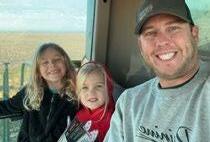
“He has been farming for over 40 years,” Mages said. “I kind of jumped in slowly and now I’m growing as we go on.”
Mages’ father has been very influential in his life when it comes to agriculture, but particularly when it comes to agricultural advocacy. John motivated his son to join the Minnesota Soybean Growers Association. Soon thereafter, he joined the Clay-Wilkin County Corn & Soybean board.
“If we want to keep the farm going, we need a strong community to educate on why it’s important to support local farmers,” Mages said. “(Membership in MSGA) is a small price to pay for your future.”
Born and raised in Ada, Danny Brandt has been involved in the agriculture industry since he was a youngster. In high school, Brandt started investing in the family operation and eventually started raising his own crops. From there, he decided to pursue farming as a career. This upcoming growing season will mark Brandt’s 38th year of working on his family’s farm in Norman County.
“Farming and producing came natural to me,” said Brandt, a member of the Norman County Corn & Soybean Growers Association. “I like the challenges of the agricultural world. It’s always changing.”
Brandt enjoys sharing his love for farming with his three children, who will be the fifth generation on the family farm. He is excited to have his oldest son, aged 14, gradually stepping into more important roles on the farm.

DANNY BRANDT
“My children are eyeing up the world of agriculture,” said Brandt. “It’s very exciting to see their interest.”
As a father, Brandt sees the importance of having the next generation’s voice heard when it comes to agricultural advocacy. That’s one of the many reasons why he supports his industry through membership in the Minnesota Soybean Growers Association.
“We have to keep telling our story,” Brandt said. “It’s important for my kids to know that their voices mean something.”
74 - Soybean Business - MARCH - APRIL - 2024
Membership Moves the Needle!
The Minnesota Soybean Growers Association thanks the over 20 members who joined MSGA to begin 2024. We also extend heartfelt appreciation to the nearly 350 producers, industry professionals and supporters who renewed their membership in the past few months. Because of your ongoing support, our membership levels continue elevating.
But our work in 2024 has only just begun. We’re advocating in St. Paul and Washington, D.C., representing Minnesota during the American
Member County
Chris Tiedeman Anoka
Peter Widmer Le Sueur
Danny Nuese Lincoln
Jason Nielsen Lincoln
Aiden LaPlante McLeod
Callie Klabunde McLeod
Kellen Nelson McLeod
Larry D. Michaletz McLeod
Jon Wiering McLeod
Jeff and Lisa Bayerl McLeod
Cole Anderson Meeker
Cut on the line and return today
Soybean Association’s resolution process and promoting our policy priorities through media engagements, with one clear goal in mind: Protecting the profitability of Minnesota’s soybean farmers. Let’s keep moving agriculture forward, together. To become a member of the nation’s longest-running state soybean association, visit mnsoybean.org/ msga/invest. Membership levels start at just $20 for students, and a 3-year membership costs less than a quarter per day!
Member County
Nathan Beech Murray
Brandon Beranek Nicollet
Steve Klein Out of State
Gabrielle Carmichael Renville
Arden Fick Rock
Savanah Warne Roseau
Keith Erickson Wabasha
Vance Blomgren Watonwan
Mark Knutson Wilkin
Emily Matejka NA
Name:____________________________________Date of Birth:______/________/_______
Farm/Company Name:______________________________________
Address:___________________________________________________________________
City:_____________________________State:______Zip:_________County:_____________
Email:*________________________Phone:*_________________Cell:__________________
3-Year Membership: $250 (includes Minnesota Soybean sweatshirt and $100 biodiesel rebate)
Pullover size (circle one): S M L XL XXL XXXL
Biodiesel Coupon (Value $100)
1-Year Membership: $120
Yes I want to save $20! 1-Year Membership: $100 (with auto renew payment via credit card). By checking this option, I understand my annual membership to MSGA will renew automatically, charging the credit card on file at the time my membership expires Young Professional (age 35 and under) & Retired: $70
Student (age 22 and under): $20
I’m a new member Renewing member
Payment information:
Check Enclosed (payable to MSGA)
CC: (VISA/MASTER?DISC/AMEX)
Card:__________________________
Exp. Date (M/Y):____/____
CVV:____
Signature_______________
Minnesota Soybean Growers Association 1020 Innovation Lane Mankato, MN 56001 507-388-1635
Online applications also available at mnsoybean.org/msga/invest
MARCH - APRIL - 2024 - Soybean Business - 75
ID#____________Recruiter
Name:______________

LIFE IS B ett er WITH A TEAM YOU CAN TRUST
We’re on your team to provide expert orthopedic care you can count on. Our hand and wrist specialists at Sanford Orthopedics & Sports Medicine provide the highest quality of patientcentered, advanced care that goes unmatched in the region, offering innovative procedures like wide-awake surgery.
We treat a variety of hand and wrist conditions, including:
• Acute hand and wrist injuries
• Arthritis
• Carpal or cubital tunnel syndromes
• Dupuytren’s contracture
• Ganglion cysts
• Nerve injuries
• Trigger finger
Call (605) 328-2663 to schedule an appointment.





201-958-866 12/23
Hao Li, MD Hand Surgery
Robert Van Demark Jr., MD Hand Surgery
Matthew Anderson, MD Hand Surgery
Hillary Becker, MD Hand Surgery
Elizabeth Helsper, MD Hand Surgery
































 By Kristeena Thisius
By Kristeena Thisius














 District 1, 2 & 3
Corey Hanson
Gary, Minn., Norman County
District 4
Paul Freeman
Fergus Falls, Minn., Pope County
District 1, 2 & 3
Corey Hanson
Gary, Minn., Norman County
District 4
Paul Freeman
Fergus Falls, Minn., Pope County





 District 8
Scott Schoper
District 9
Ben Storm
Dover, Minn., Olmsted County
District 8
Scott Schoper
District 9
Ben Storm
Dover, Minn., Olmsted County




 By Sydney Harris
By Sydney Harris









 By Sydney Harris
By Sydney Harris



























 By Soybean Business Staff
By Soybean Business Staff
























